Download News 2013/4
Brian Wilson
The previous Download News – 2013/3 – here
– was in such danger of becoming a Telemann-fest that I
held some of the reviews over to this time; now I find that this edition
is in the same boat. Indeed, as in the days when I produced just one
Download Roundup per month it’s become altogether too big for its
boots. I’ll try to be less prolific next time.
See the Download News archive here.
Recordings of the Month: New Repertoire
Johann Sebastian BACH (1685-1750)
Johannes-Passion: St John Passion (1724-49) sung within a reconstruction
of Bach’s Passion Liturgy
Evangelist and Tenor – Nicholas Mulroy (tenor)
Jesus and Bass – Matthew Brook (bass)
Joanne Lunn (soprano)
Clare Wilkinson (alto)
Petrus and Pilatus – Robert Davies
Dunedin Consort/John Butt (harpsichord and organ preludes)
Motets and chorale harmonizations for the liturgy sung by the University
of Glasgow Chapel Choir/James Grossmith – rec. September and November
2012. DSD.
Pdf booklet with texts and translations included
LINN CKD419 [2 CDs: 139:00] – from linnrecords.com
(SACD, mp3, 16-bit, 24/96 and 24/192 lossless)
Johannes-Passion: St John Passion (1724-49)
Evangelist – Ian Bostridge (tenor)
Christ – Neal Davies (bass)
Carolyn Sampson (soprano)
Iestyn Davies (countertenor)
Nicholas Mulroy (tenor)
Roderick Williams (bass)
Polyphony
Orchestra of the Age of Enlightenment/Stephen Layton – rec. April
2012. DDD
Pdf booklet with texts and translations included
HYPERION CDA67901/2 [2 CDs: 118:10] – from hyperion-records.co.uk
(mp3 and 16– and 24-bit lossless)
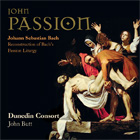 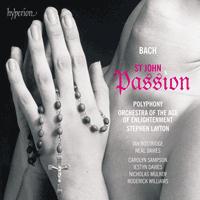 This
started as a short review, not just because I obtained these recordings
only on the very cusp of closing this Download News but also because
I have no significant criticism to level against either of them. This
started as a short review, not just because I obtained these recordings
only on the very cusp of closing this Download News but also because
I have no significant criticism to level against either of them.
Until recently the status of John Eliot Gardiner’s recordings of
the Bach Passions, Christmas Oratorio and b-minor Mass (DG – see
below) was unassailed. John Butt and the Dunedin Consort on Linn
challenged the hegemony of Gardiner’s Matthew Passion a couple
of years ago and now they’ve done it again with the John Passion.
That’s an even bigger plus for me because, though it’s impossible
to choose between two such mighty masterpieces, I tend slightly more
towards the St John.
Not only is this an exceptionally fine small-scale performance and recording
with scholarly but readable notes, it attempts to bring us closer to
the way in which the original listeners experienced the passion on Good
Friday – not a particular Good Friday because it’s a composite
of the various revisions, though as close as possible to the projected
1739 version – but with material from the Lutheran Vespers service
as celebrated at Leipzig in the early 18th century.
Thus, before the Passion music, we have the organ chorale prelude: Da
Jesus an dem Kreuze stund, BWV 621, and the congregational chorale:
Da Jesus an dem Kreuze stund. As a response to Part 1 we have
the organ chorale prelude: O Lamm Gottes unschuldig, BWV 618,
and Congregational Chorale: O Lamm Gottes unschuldig, followed
by an optional sermon and intercession (available for free separate
download). Part 2 is preceded by the organ chorale prelude and the chorale:
Christus, der uns selig macht, BWV 620 and the programme is rounded
off after Part 2 with the Jakob Handl motet: Ecce quomodo moritur,
Responsory, Collect, Blessing, Response to Blessing: Gott sei uns
gnädig und barmherzig, organ chorale prelude: Nun danket
alle Gott, BWV 657 and congregational chorale: Nun danket alle
Gott.
I’m not going to get into the debate about one-to-a-part singing
of Bach, merely to say that there is strong evidence to support it and
that it works very well here. I said that I had no criticism to offer,
but there’s one small point which I ought to raise: Ecce quodmodo
moritur follows a little too hard on the heels of the end of Bach’s
final chorale.
The new recording won’t cost you a fortune, with prices ranging
from £8 (mp3) to £18 (24-bit). I’m not about to jettison
John Eliot Gardiner, whose four Bach recordings, the two Passions, Christmas
Oratorio and b-minor Mass, can also be obtained for an advantageous
price in a 9-CD DG box set (469 7692: target price £45
or download from 7digital.com
for £23.99) but I shall certainly be playing the Dunedin Consort’s
St Matthew and John Passions this Holy Week, too.
Thus far I had reached when I obtained Hyperion’s new recording:
If you feel uncomfortable with a St John Passion in the context of Lutheran
Vespers or with one-to-a-part in the choruses, Stephen Layton and his
distinguished team on Hyperion offer a more conventional approach. More
conventional, however, doesn’t mean inferior and certainly not
stodgy in the ’traditional’ manner; this could well be your
first choice if you are looking for a 24-bit download.
I should mention that Hyperion have adopted a policy of offering their
24-bit downloads at 88.2kHz, a format which Windows up to version 7
doesn’t support, so that although my DAC can cope with that frequency,
it doesn’t get the chance to do so and has to be set at 44.1. That
means that in theory I’m listening to sound inferior to Linn’s
24/96 offering. In practice my septuagenarian ears can’t tell much
difference – both sound very good and should be preferable to the
16-bit CD version – though younger, sharper-eared audiophiles may
believe that they do so.
After the preliminary material on Linn – it’s several minutes
before the Passion proper begins – it actually sounds odd to begin
on Hyperion in medias res with Herr unser Herrscher. At
9:04 Stephen Layton’s account of that opening is marginally slower
than John Butt’s 8:43, a minimal difference typical of the two
performances; in practice the pace is almost identical throughout both
recordings – timings are usually mere seconds apart and Layton
sometimes is actually marginally faster, as in Erwäge wie sein
blutgefärbter Rücken (II: No.38) where his 8:37 compares
with Butt’s 8:45.
Whereas Butt seeks to conform to Bach’s putative 1739 model, for
which he actually wrote out the first twelve numbers, Layton is content
to follow the Neue Bach Ausgabe, a sensible compromise text,
though one which Bach admittedly never actually performed, but he includes
as an appendix accompanied versions of three chorales which he has come
to prefer in unaccompanied form in performance practice over a number
of years. Overall the Hyperion version shares the virtues of their Messiah
recording, also with Iestyn Davies, Polyphony and Stephen Layton (CDA67800
– review
and review).
Both booklets are excellent, as you would expect. All in all, then,
two excellent new recordings of this wonderful music; choice can safely
be left to whether Hyperion on CD and 24/88.2 will do or you must have
Linn on SACD or 24/96 or 24/192 sound and on how you feel about the
additional items on Linn. If it matters, Linn have the more eye-catching
cover.
I see that John Quinn was also impressed by the Hyperion recording –
review.
Recording of the Month: Back Catalogue
Claudio MONTEVERDI (1567-1643) Il Sesto libro di madrigali (6th
book of madrigals, 1614)
Concerto Italiano/Rinaldo Alessandrini
No booklet – no texts
OPUS111/NAÏVE OP30423 [63:08] – from eclassical.com
(mp3 and lossless) or stream from Naxos Music Library
[also available on CD at mid price as OPUS111/NAÏVE OP30522]
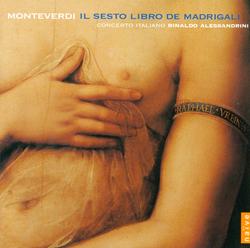 A
short review is almost always a sign of strong approval and this can
be very brief: I don’t know of any recording of these madrigals
to match this, let alone excel it. Having owned these performers’
3-CD set of the Eighth Book (OP30435: Recording of the
Month – review)
I knew that I would approve right from the start and so it proves. I’d
recommend that Eighth Book first – also available to download in
mp3 and lossless from classicsonline.com
– but that’s the only reservation apart from the lack of texts,
which, unfortunately, is becoming a regular grumble on my part. It’s
only partly offset by the availability of online scores of some of these
madrigals, including the words and score of Lamento d’Arianna
– here. A
short review is almost always a sign of strong approval and this can
be very brief: I don’t know of any recording of these madrigals
to match this, let alone excel it. Having owned these performers’
3-CD set of the Eighth Book (OP30435: Recording of the
Month – review)
I knew that I would approve right from the start and so it proves. I’d
recommend that Eighth Book first – also available to download in
mp3 and lossless from classicsonline.com
– but that’s the only reservation apart from the lack of texts,
which, unfortunately, is becoming a regular grumble on my part. It’s
only partly offset by the availability of online scores of some of these
madrigals, including the words and score of Lamento d’Arianna
– here.
Ariadne’s Lament, which opens Book Six, was originally part
of Monteverdi’s 1608 opera Arianna, now lost, only the enormous
popularity of the Lament having preserved several versions of this one
small part, also as an adaptation as a lament for the Virgin Mary. I
was only partly persuaded by Véronique Gens (Lamento,
Virgin 5190442 – review)
so the main competition for the Opus 111 recording comes from Emma Kirkby
(Deutsche Harmonia Mundi, budget price). That DHM CD no longer seems
to be available in the UK, leaving Alessandrini and his team principal
victors apart from an inexpensive 7-CD Virgin set of Books 1-3 and 6-8
which also features Emma Kirkby and Anthony Rooley (0833972 –
a steal at £8.99 from sainsburysentertainment.co.uk,
little more than you’d pay for the 2-CD set from Book Eight in
the same performances, itself a bargain).
I wouldn’t recommend economising on Book Six alone with the Naxos
recording which I reviewed
some time ago.
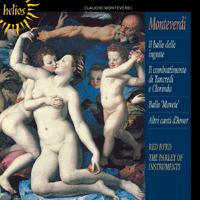
If you’re looking for a shorter selection of madrigals from Book
Eight, Hyperion have an inexpensive answer: CDH55165
contains very good performances from Red Byrd and The Parley of Instruments/Peter
Holman of Altri canti d’Amor, Il Combattimento di Tancredi
e Clorinda, the Ballo Movete and Il Ballo delle Ingrate
[69:04]; this time the texts are included and the cover displays
one of the most striking paintings in the whole of renaissance Italian
art.
Reissues of the Month
Tomaso Giovanni ALBINONI (1671-1750/51) Concerti a cinque,
Opp. 7 and 9
Anthony Robson (oboe), Catherine Latham (oboe), Ann Robson (oboe)
Collegium Musicum 90/Simon Standage – rec. 1995. DDD.
CHANDOS CHAN0792 [3 CDs: 196:56] – from theclassicalshop.net
(mp3 and lossless)
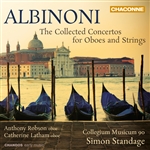
This is a reissue of three recommended recordings released separately
in the 1990s: CHAN0579 – July 2009 Roundup
– CHAN0602 – February 2010 Roundup
– and CHAN0610 – July 2010 Roundup.
Whereas before the concertos from Op.7 and Op.9 were intermingled, the
new rearrangement presents them in chronological order; that, plus the
reduced price, effectively 3 for the price of 2, makes these recordings
even more attractive. Don’t forget that Chandos and Collegium 90
also have fine recordings of Albinoni’s Op.5 (CHAN0663)
and Op.10 (CHAN0769) concertos.
Richard WAGNER (1813-1883)
Die Meistersinger Prelude [9:35]
Prelude and Liebestod from Tristan und Isolde [16:56]
Overture Tannhäuser [13:22]
Overture The Flying Dutchman [11:15]
Cleveland Orchestra/George Szell
Source used for transfer: Columbia (CBS) LP – rec. 26 January,
1962
pdf booklet available
HIGH DEFINITION TAPE TRANSFERS HDDL362 [51:08] – from highdeftapetransfers.com
(24/96 and 24/192 lossless)
 Powerful
performances in recordings which hardly sound their age in these transfers.
The Meistersinger Prelude and the Tristan Prelude and
Liebestod were until recently available on budget-price Sony
SBK48175 but that recording seems no longer to be generally available
in the UK, which makes the HDTT album all the more welcome. I doubt
that the mp3 transfer from amazon.co.uk or even the 320kbs version from
7 digital sounds anything like as well as these 24-bit downloads. Even
if you have that CD you can still purchase the remaining tracks separately
from HDTT. Powerful
performances in recordings which hardly sound their age in these transfers.
The Meistersinger Prelude and the Tristan Prelude and
Liebestod were until recently available on budget-price Sony
SBK48175 but that recording seems no longer to be generally available
in the UK, which makes the HDTT album all the more welcome. I doubt
that the mp3 transfer from amazon.co.uk or even the 320kbs version from
7 digital sounds anything like as well as these 24-bit downloads. Even
if you have that CD you can still purchase the remaining tracks separately
from HDTT.
These recordings didn’t originally appear together in the UK. The
Meistersinger Prelude and the Tristan Prelude and Liebestod
were coupled with Beethoven’s Choral Symphony on UK Columbia –
a hangover of an old contractual arrangement, even though CBS, who had
long been allied with Philips, had gone it alone by that time. Later
the Tristan music re-appeared coupled with Bruckner’s Eighth
Symphony and earned a strong recommendation for its symphonic finesse
rather than dramatic involvement – which, surely, is the right
way to tackle these two conjoined items from opposite ends of the opera
when the drama in-between is not there for the conductor to get involved
in. That doesn’t mean, however, that the performance is lacking
in passion.
That’s true of the other items, too; the reissue is most welcome
for the sparkle of the performances and the quality of the sound which
HDTT have coaxed out of the grooves of that (US) Columbia LP. I know
that some will be snooty about having the two bleeding chunks of Tristan
yoked together – I’m not one of them; they are the only potential
buyers who need hesitate. Nor will the purchase break the bank: 7digital.com
are asking almost £8.00 for their mp3 download of the Sony CD,
so $12.00 for 24-bit sound is hardly exorbitant. Szell had something
of a reputation as a whizz-kid – his Dvořák Slavonic Dances
are still just about the most exciting on the market – but though
his Tannhäuser Overture is comparatively fast alongside,
say, Karajan (DG) that doesn’t mean that his conducting was superficial.
When three of these items were reissued on (French) CBS 60019 in 1984,
the lack of ambient breadth of the sound was commented on. You wouldn’t
mistake these for modern digital recordings, but I certainly wouldn’t
call this transfer of the recording of the Tannhäuser or
Dutchman overtures in particular lacking in breadth.
Classic Walton
William WALTON (1902-1983) Belshazzar’s Feast [36:12]
Donald Bell (baritone)
Philharmonia Orchestra and Chorus/William Walton – rec. 1958. ADD/stereo
Façade: an Entertainment [36:57]
Edith Sitwell, Peter Pears (speakers)
English Opera Group Ensemble/Anthony Collins – rec. 1954. ADD/mono
BEULAH 1PD60 [72:42] – due for release by iTunes (mp3).
Also released by amazon.co.uk
(mp3)
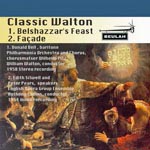 Classic
Walton, indeed: of all the fine recordings of Belshazzar’s Feast
this can claim to be the benchmark and the 1954 recording of Façade
has never been equalled. Though both are available elsewhere, differently
coupled – Façade on Decca Eloquence 480 3783,
with Overtures and music by Bax and Bliss; and Belshazzar as part of
Walton Conducts Walton, 5 CDs, EMI 6805012 (see review
of earlier release) – the arrangement here will appeal to many
and the download price is competitive with those other recordings, though
I should point out that hmvdigital.com (now subsumed into 7digital.com)
offer the 2-CD EMI Walton conducts Walton set containing Belshazzar,
its original coupling, Partita, the First Symphony and Violin
Concerto for £5.99. Classic
Walton, indeed: of all the fine recordings of Belshazzar’s Feast
this can claim to be the benchmark and the 1954 recording of Façade
has never been equalled. Though both are available elsewhere, differently
coupled – Façade on Decca Eloquence 480 3783,
with Overtures and music by Bax and Bliss; and Belshazzar as part of
Walton Conducts Walton, 5 CDs, EMI 6805012 (see review
of earlier release) – the arrangement here will appeal to many
and the download price is competitive with those other recordings, though
I should point out that hmvdigital.com (now subsumed into 7digital.com)
offer the 2-CD EMI Walton conducts Walton set containing Belshazzar,
its original coupling, Partita, the First Symphony and Violin
Concerto for £5.99.
The recording of Belshazzar received rave reviews on its first
appearance in mono and again when it was released in stereo and though
other fine versions have since appeared, not least from André
Previn, it remains strongly competitive. Not everyone will think Donald
Bell the ideal soloist – he’s a little too lyrical rather
than dramatic – but that’s hardly enough to spoil my enjoyment
and the recording wears its years very lightly. If, however, you must
have a more recent recording, Chandos provide the answer on a 2-for-1
release (CHAN241-10, with Symphony No.1, Cello Concerto, Coronation
Te Deum, Orb and Sceptre and Crown Imperial).
Façade also sounds well, though, it’s mono only.
The performance is unequalled, even by the Hyperion recording –
review
and July 2012/1 Roundup.
It’s this inimitable coupling that ultimately leads me to recommend
the Beulah Belshazzar in preference to the slightly less expensive EMI
twofer from hmvdigital.com.
John Coltrane: Blue Train Special
So what?* [8:24]
Blue train [10:41]
Moment’s notice [9:08]
Locomotion [7:13]
I’m old-fashioned [7:56]
Lazy Bird [7:03]
Miles Davis (trumpet)*; John Coltrane Quartet and Sextet
PAST CLASSICS JAZZ [50:29] – from emusic.com
(mp3)
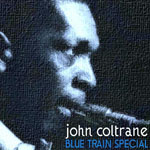
The bit-rate of the opening track is abysmally low but the quality of
the music-making shines through the less than ideal sound and the download
will cost you only £2.52. It’s a shame that we don’t
get to hear Miles Davis’s contribution in decent sound but the
bit-rate and sound quality from the early 1960s (?) – the download
comes without documentation – improve dramatically thereafter.
Amazon.co.uk
have an alternative album – the same programme minus So what
but with East Train, for even less, at £1.49.
Discovery of the Month
Peggy GLANVILLE-HICKS (1912-1990)
Sappho: opera in three acts (text by Gerald Durrell)
Deborah Polaski (soprano) Sappho
Martin Homrich (tenor) Phaon
Scott MacAllister (tenor) Pittakos
Roman Trekel (baritone) Diomedes
Wolfgang Koch (bass-baritone) Minos
Sir John Tomlinson (bass) Kreon
Jacquelyn Wagner (soprano) Chloe/Priestess
Bettina Jensen (soprano) Joy
Maria Markina (mezzo soprano) Doris
Laurence Meikle (baritone) Alexandrian
Coro Gulbenkian
Orquestra Gulbenkian/Jennifer Condon
First recording
Pdf booklet with texts available from toccataclassics.com
TOCCATA CLASSICS 0154/5 [2CDs: 61:21 + 66:48] – from toccataclassics.com
(mp3) or eclassical.com
(mp3 and lossless, no booklet) or stream from Naxos Music Library (with
booklet) or purchase on CD from MusicWeb
(£21 post-paid worldwide)
[see review
by John Sheppard: Recording of the Month]
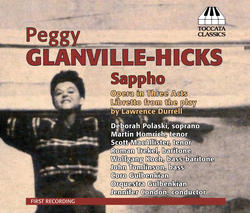 What
a wonderfully versatile and adventurous label Toccata Classics is and
what a wide range of repertoire it covers. Who else would record Peggy
Glanville-Hicks’ last opera, which hadn’t even been performed
in full before, let alone recorded – Hyperion or Chandos, perhaps?
Just the final scene had been recorded before, with the Etruscan
Concerto on ABC Classics – review
and October 2011/1 Roundup
– but now we have the whole thing. What
a wonderfully versatile and adventurous label Toccata Classics is and
what a wide range of repertoire it covers. Who else would record Peggy
Glanville-Hicks’ last opera, which hadn’t even been performed
in full before, let alone recorded – Hyperion or Chandos, perhaps?
Just the final scene had been recorded before, with the Etruscan
Concerto on ABC Classics – review
and October 2011/1 Roundup
– but now we have the whole thing.
Half way through my writing this review John Sheppard, in making the
CDs his Recording of the Month, said just about all that
needs to be said, so it only remains for me to report that the download
sounds fine in lossless form and to urge you to support the venture
by buying the recording in one form or another.
Verdi Anniversary Bargains
Giuseppe VERDI (1813-1901) Macbeth
Maria Callas (Lady Macbeth), Enzo Mascherini (Macbeth), Gino Penno (Macduff),
Italo Tajo (Banco), Luciano della Pergola (Malcolm), Angela Vercelli
(Dama), Dario Caselli (Medico), Attilio Barbesi (Domestico), Mario Tommasini
(Sicaro)
Orchestra e Coro del Teatro alla Scala di Milano/Victor de Sabata –
rec. live 1952. ADD/mono
DISCOVER CLASSICAL [2:18:49] – from emusic.com
(mp3)
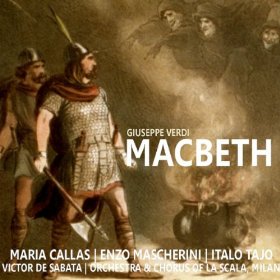 This
is an essential purchase for Callas fans at £2.10 or less –
I’m not a great lover of Callas’s voice, but the squallier
the better in this role, especially as in 1952 her worst vocal idiosyncrasies
were yet to come. She is, indeed, excellent in the role and de Sabata
at the helm practically guarantees success apart from the very rare
misjudged tempo, but I had forgotten how indifferently Callas is supported
by the rest of the cast and the recording really demands a great deal
of tolerance – I’ve heard better from pre-electric 78s originals
– though there are patches where it sounds more than bearable. This
is an essential purchase for Callas fans at £2.10 or less –
I’m not a great lover of Callas’s voice, but the squallier
the better in this role, especially as in 1952 her worst vocal idiosyncrasies
were yet to come. She is, indeed, excellent in the role and de Sabata
at the helm practically guarantees success apart from the very rare
misjudged tempo, but I had forgotten how indifferently Callas is supported
by the rest of the cast and the recording really demands a great deal
of tolerance – I’ve heard better from pre-electric 78s originals
– though there are patches where it sounds more than bearable.
At the emusic.com price this is a bargain but for better sound you have
to pay a little more for the Abbado recording on DG originals –
amazon.co.uk have the 2-CD set (449 7322) for less than any download
of that recording that I’ve been able to find.
Giuseppe VERDI Aïda
Radamès – Jussi Björling (tenor), Aïda –
Zinka Milanov (soprano), Ramfis – Boris Christoff (bass), Amonasro
– Leonard Warren (baritone), Amneris – Fedora Barbieri (mezzo-soprano),
King of Egypt – Plinio Clabassi (bass)
Rome Opera Chorus and Orchestra/Jonel Perlea – rec. 1955. ADD/mono
DISCOVER CLASSICAL MUSIC [40:44 + 41:18 + 32:47 + 33:10] –
from emusic.com
(mp3)
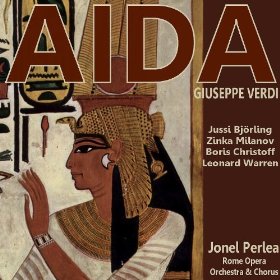 At
£1.68 or less this is a steal for fans of Jussi Björling
– if I say that he was the greatest non-Italian tenor you’ll
know that I count myself one. The recording requires some tolerance
– at first it sounds as if it were made in a metal tank, but the
ear soon compensates. With only highlights now available from RCA, the
only current alternative is the Naxos Historical transcription in preferable
sound but costing rather more, even as a download from classicsonline.com
(8.111042-4, with highlights from Un Ballo in Maschera). At
£1.68 or less this is a steal for fans of Jussi Björling
– if I say that he was the greatest non-Italian tenor you’ll
know that I count myself one. The recording requires some tolerance
– at first it sounds as if it were made in a metal tank, but the
ear soon compensates. With only highlights now available from RCA, the
only current alternative is the Naxos Historical transcription in preferable
sound but costing rather more, even as a download from classicsonline.com
(8.111042-4, with highlights from Un Ballo in Maschera).
Callas fans will prefer her studio recording from the same year, with
Tito Gobbi and with Tullio Serafin directing. I’m not normally
a Callas enthusiast but, as with Macbeth, this is one exception
that I’m prepared to make (EMI – see July 2010 Roundup).
Ignore the passionato link, which no longer applies. The least expensive
download is from classicsonline.com.
Some sites offer the highlights without making that clear – be
careful what you purchase.
That download of the EMI transfer is the safest bet – it still
sounds very well, in fact – but you’ll find various other
downloads online for as little as £0.84 from emusic.com here
(Acts I and II) and here
(Acts II conclusion, III and IV). I can’t vouch for the quality;
the preview sounds acceptable only. On disc this recording appears to
be available only in a bumper 35-CD edition.
Britten Anniversary Bargains
Benjamin BRITTEN (1913-1976) The Prince of the Pagodas (ballet)
Royal Opera House Orchestra Covent Garden/Benjamin Britten – rec.
1957. ADD/mono
NAXOS CLASSICAL ARCHIVES 9.80379/80 [98:48] – from emusic.com
or classicsonline.com
(mp3) or stream from Naxos Music Library
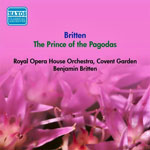 When
this recording was released on Decca LXT5336/7 in mid-1957 the ballet
was quite new, having been premiered on New Year’s Day of that
year – that’s almost as fast as modern technology now brings
us recordings on CD and DVD. Be aware that the ballet was cut in order
to fit on two LPs and that Decca have produced their own, more expensive
reissue (478 4203 – download from amazon.co.uk.
Also on 7-CD set 475 6051.). The music is attractive, the performances
authoritative and while the recording may no longer merit the description
‘first-rate’ – perhaps partly because the emusic.com
transfer to which I listened is made at a very low bit-rate – it’s
certainly more than tolerable. Emusic.com’s £1.26 is less
expensive than classicsonline.com’s £3.98, but the latter
may sound better. When
this recording was released on Decca LXT5336/7 in mid-1957 the ballet
was quite new, having been premiered on New Year’s Day of that
year – that’s almost as fast as modern technology now brings
us recordings on CD and DVD. Be aware that the ballet was cut in order
to fit on two LPs and that Decca have produced their own, more expensive
reissue (478 4203 – download from amazon.co.uk.
Also on 7-CD set 475 6051.). The music is attractive, the performances
authoritative and while the recording may no longer merit the description
‘first-rate’ – perhaps partly because the emusic.com
transfer to which I listened is made at a very low bit-rate – it’s
certainly more than tolerable. Emusic.com’s £1.26 is less
expensive than classicsonline.com’s £3.98, but the latter
may sound better.
The more recent EMI recording from the London Sinfonietta/Oliver Knussen,
coupled with the Dances from Gloriana, is also available at an
attractive price (£4.99) from sainsburysentertainment.co.uk.
See review
of a more recent reissue of this recording coupled with Bartók.
Benjamin BRITTEN (1913-1976) Historic recordings
Simple Symphony, Op.4* [17:32]
Serenade for tenor, horn and strings, Op.31** [24:35]
Variations on a Theme of Frank Bridge, Op.10^ [26:13]
**Peter Pears (tenor); Dennis Brain (horn)
Boyd Neel String Orchestra/Boyd Neel; **Benjamin Britten – rec.
*1939, **1944, ^1953. ADD/mono
BEULAH 2PD14 [68:32] – from iTunes
or amazon.co.uk
(both mp3)
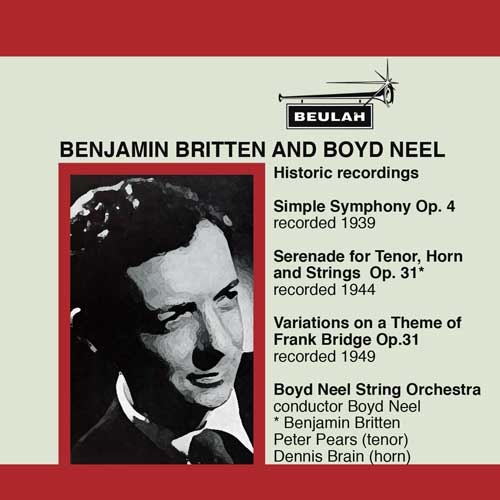 Classic
Britten recordings, now deservedly offered together in good transfers.
The earliest recording, of the Simple Symphony, dates from 1939
but a certain minor skirmish in September of that year caused the release
to be overlooked by Compton Mackenzie until 1944. His initial reaction
to this juvenile work was spot on in my opinion: it’s charming
and immediately entertaining but hardly hangs together as a symphony
or makes a lasting impression. It couldn’t have had a better advocate
than Boyd Neel, even though it was later recorded by Britten himself
(Decca E417 5092) and the recording, bright but thin, sounds
remarkably fresh. Classic
Britten recordings, now deservedly offered together in good transfers.
The earliest recording, of the Simple Symphony, dates from 1939
but a certain minor skirmish in September of that year caused the release
to be overlooked by Compton Mackenzie until 1944. His initial reaction
to this juvenile work was spot on in my opinion: it’s charming
and immediately entertaining but hardly hangs together as a symphony
or makes a lasting impression. It couldn’t have had a better advocate
than Boyd Neel, even though it was later recorded by Britten himself
(Decca E417 5092) and the recording, bright but thin, sounds
remarkably fresh.
The Pears-Brain recording of the Serenade is available from several
sources, including a Decca Eloquence CD of Pears-Britten Premieres (480
5055) but many will find the Beulah coupling the most appropriate.
The Documents label offers downloads of Britten recordings, the Simple
Symphony and the earlier 78s recording of the Variations
from 1938 on Volume 1 (1938-47) and the Serenade on Volume 2
(1942-44).
Pears, Brain and Britten recorded the work again in 1953, a recording
which was reissued in dubious electronic stereo on Decca Eclipse and
more recently on a Regis CD at budget price, but that version didn’t
quite have the force of the 1944 premiere or the recording quality of
the stereo version with Pears and Tuckwell. In a detailed and perceptive
review Alec Robertson was immensely stirred by the release of the premiere
recording in 1945 and, though the sound is no longer to be described
as’often very good’, Beulah’s transfer is impressive
– fuller in tone and more faithful than the Simple Symphony
but afflicted by a (tolerable) degree of 78 noise. Stay away only if
Peter Pears’ voice is totally anathema – I know there are
those who find it so. I’m not immensely keen except in Britten
but the Serenade has never sounded better than in this recording;
try the powerful Dirge on track 9 if you’re not sure.
Boyd Neel recorded the Bridge Variations on 78s in 1938 and again
1950 but this is a reissue of the LP remake from 1953, first released
slightly oddly coupled with Peter Warlock’s jaunty Capriol Suite.
By this third recording the orchestra, the original dedicatees of the
work, had mastered all the difficulties of the music to perfection and
the recording is more than tolerable – a bit too brightly lit.
Freebie of the Month
Richard STRAUSS (1864-1949) Metamorphosen, AV142 [33:13]
Pyotr Iyich TCHAIKOVSKY (1840-1893) Souvenir de Florence,
Op.70 (arr. for string orchestra) [24:38]
Norwegian Chamber Orchestra/Iona Brown – rec. 1996. DDD.
Pdf booklet available
CHANDOS CHAN9708 [61:48] – from theclassicalshop.net
(mp3 and lossless)
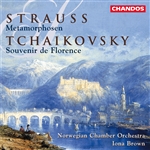
This recording, released a few years too early to have been reviewed
on MusicWeb International, was Chandos’ most recent free mp3 download
with their email newsletter – well worth signing up for. The performances
may not be the last word in performances of either work; though they
received a four-star accolade in the Penguin Guide, that seems over-generous
and runs counter to the general run of review opinions. Worth having
as a gift, however.
***
Passion and Resurrection: Music inspired by Holy Week and Easter
William CORNYSH Woefully arrayed [7:37]
Orlando GIBBONS Hosanna to the Son of David [2:54]
Thomas TALLIS O sacrum convivium [4:17]
Orlande de LASSUS In monte oliveti [3:59]
Cristóbal de MORALES O crux ave [3:41]
Tomás Luis de VICTORIA O vos omnes [4:16]
John McCABE Woefully arrayed (first recording) [9:58]
John TAVERNER Dum transisset [8:41]
Francisco GUERRERO Maria Magdalene [7:02]
William BYRD In resurrectione tua [1:52]
Jean LHÉRITIER Surrexit pastor bonus [5:08]
Orlando GIBBONS I am the Resurrection and the Life [4:26]
Thomas CRECQUILLON Congratulamini mihi [7:23]
Stile Antico – rec. February 2012. DSD.
HARMONIA MUNDI HMU807555 (32763549) [71:08] – from eclassical.com
(mp3 and lossless, no booklet) or classicsonline.com (mp3, with booklet)
[See review
by John Quinn: Recording of the Month]
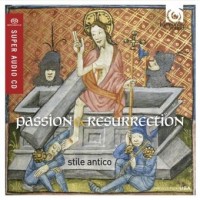 All
the music here, with one exception, comes from the flowering of renaissance
polyphony and the era immediately after that flowering, in England a period
from William Cornysh at the turn of the 15th and 16th centuries to Orlando
Gibbons more than a hundred years later. All
the music here, with one exception, comes from the flowering of renaissance
polyphony and the era immediately after that flowering, in England a period
from William Cornysh at the turn of the 15th and 16th centuries to Orlando
Gibbons more than a hundred years later.
Stile Antico have already amply demonstrated their prowess in the music
of this period and they do so again here. Apart from the fact that they
make some of the music sound a little too beautiful – Victoria’s
setting of O vos omnes, from the Good Friday Improperia
or Reproaches could do with sounding more reproachful – my only reservation
is that almost everything here is available in first-class recordings
from the likes of The Tallis Scholars and The Sixteen on CDs which you
may prefer for their couplings. A superb interpretation of Cornysh’s
Woefully arrayed, for example, can be found on a selection of his
music from The Tallis Scholars (CDGIM014). There are also recommendable
versions on a budget Alto offering, formerly Saga, from the Hilliard and
New London ensembles (ALC1015) and, with music by Taverner, again
from the Paul Hillier on Ars Nova (8.226050). I’d like to
hear more of Stile Antico in the music of a single composer, preferably
one who has not been over-recorded, as on their CD of Sheppard, HMU807059
– April 2010 Download Roundup.
The exception to the run of renaissance music comes at the mid point of
the programme with another setting of Skelton’s Woefully arrayed,
this time as commissioned for performance by Stile Antico from John McCabe.
Though clearly written in a modern, more angular idiom, the work fits
in very well and here the performance does have that extra bite that I
found slightly lacking on some other tracks.
The lack of texts constitutes a serious problem; to obtain them you’ll
have to choose the mp3-only version from classicsonline.com and eschew
the excellent lossless download for around the same price from eclasscal.com.
It shouldn’t have to be either the notes or lossless sound –
I mustn’t go on; I’ve had too much to say on this subject in
other reviews recently.
Giovanni Pierluigi da PALESTRINA (1525-1594) Volume 3
Stabat mater [8:30]
Ad cœnam Agni providi [7:39]
Vineam meam non custodivi [3:12]
Si ignoras te, o pulchra [3:44]
Pulchræ sunt genæ tuæ [3:47]
Regina cœli [3:54]
Improperium exspectavit cor meum [3:47]
Confitebor tibi Domine [2:13]
Terra tremuit [2:15]
Missa Regina cæli [31:21]
Congratulamini mihi (bonus track) [1:59]
The Sixteen/Harry Christophers
Pdf booklet included with texts and translations
CORO COR16106 [72:29] – from thesixteendigital.com
(mp3 and 24-bit lossless) or stream from Naxos Music Library
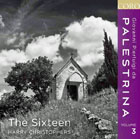 Volume
Three of this series is every bit as good as its predecessors. The programme
consists of music for Good Friday (Stabat Mater), Easter (Ad
cœnam Agni and three offertories for Eastertide) and music in
honour of the Virgin Mary (Regina cœli, the Mass based on
it and three excerpts from Palestrina’s setting of the Canticum
canticorum or Song of Songs, a love poem traditionally regarded as
applying mystically either to Mary or to the union of Christ with His
church). Volume
Three of this series is every bit as good as its predecessors. The programme
consists of music for Good Friday (Stabat Mater), Easter (Ad
cœnam Agni and three offertories for Eastertide) and music in
honour of the Virgin Mary (Regina cœli, the Mass based on
it and three excerpts from Palestrina’s setting of the Canticum
canticorum or Song of Songs, a love poem traditionally regarded as
applying mystically either to Mary or to the union of Christ with His
church).
The inclusion of three items from Song of Songs means that you will be
duplicating these pieces if you already have or intend to acquire the
excellent Virgin Classics (5622392, 2 CDs with le Vergine)
or Hyperion Helios (CDH55095) recordings of the complete work.
As those are both at budget price, however, duplication in this case comes
at small cost.
The 24/96 recording is very good. There’s a very useful booklet,
including texts and translations, with the download, which is surely as
it should be – see my grouse about some other downloads later in
this Download News. I do have one small grumble about the translation
of the first line of Ad cœnam Agni providi – it isn’t
the feast (accusative singular) that is made ready, it’s we who sing
(nominative plural) who are ready for the feast as candidi, which
means both ‘shining white [people]’ and those who are seeking
baptism, our modern word ‘candidates’, since baptism was conferred
in the early years of Christianity at Easter.
Carlo GESUALDO (c.1561-1613) Sacræ Cantiones: Liber secundus
(1603)
Responsoria (1611) Miserere [7:56]
Sacræ cantiones II: Prayers for Salvation [19:11]
I. Virgo benedicta [2:47]
V. O oriens [2:36]
XVI. O beata Mater [2:58]
XIII. Verba mea [2:26]
VIII. Veni Creator Spiritus [2:12]
IV. Ave sanctissima Maria [3:33]
III. Sana me Domine [2:39]
Despair and Weeping [8:33]
VI. Discedite a me omnes [2:27]
XIX. O anima sanctissima [3:04]
XIV. Ardens est cor meum [3:02]
Peace and Hope [8:34 ]
II. Da pacem Domine [3:19]
XV. Ne derelinquas me [2:29]
XVIII. Franciscus humilis et pauper [2:46]
VII. Gaudeamus omnes [2:11]
Praise and Thanks [17:44]
X. Adoramus te Christe [2:04]
IX. O sacrum convivium [3:53]
XVII. Ad te levavi [2:44]
XII. Assumpta est Maria [3:13]
XI. Veni sponsa Christi [2:33]
XX. Illumina nos [3:17]
Closing Canticle: Benedictus [4:59]
Vocalconsort Berlin/James Wood
HARMONIA MUNDI HMC902123 (31961853) [69:22] – from eclassical.com
(mp3, 16– and 24-bit lossless; no booklet)
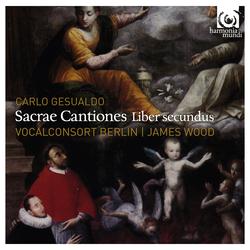 With
some of the parts lost, this book of Gesualdo’s sacred music has
not been recorded or performed before, so we must be grateful to James
Wood for reconstructing those missing bassus and sextus
parts; as Harmonia Mundi put it, a precious gem recovered. Those who know
Gesualdo’s madrigals and sacred music will not need me to tell them
how impassioned his style is. Though I’m not sure that I buy the
theory that his music was intended as partial atonement for the murder
of his wife and her lover – renaissance princes did things like that
without too much remorse and Gesualdo was Prince of Venosa – it’s
certainly appropriate that there’s more penitential than joyful music
in this selection. With
some of the parts lost, this book of Gesualdo’s sacred music has
not been recorded or performed before, so we must be grateful to James
Wood for reconstructing those missing bassus and sextus
parts; as Harmonia Mundi put it, a precious gem recovered. Those who know
Gesualdo’s madrigals and sacred music will not need me to tell them
how impassioned his style is. Though I’m not sure that I buy the
theory that his music was intended as partial atonement for the murder
of his wife and her lover – renaissance princes did things like that
without too much remorse and Gesualdo was Prince of Venosa – it’s
certainly appropriate that there’s more penitential than joyful music
in this selection.
The performances are good; though I have heard more impassioned singing
of Gesualdo’s music, the beauty of the singing makes considerable
amends. The recording, especially the 24-bit lossless, is good, but the
lack of a booklet of words is again a serious problem. The fact that I
know or know where to find most of the words is neither here nor there
– you may not and you deserve to have them if you’ve paid $18.67
for the 24/96 download.
Marin MARAIS (1656-1728) La Gamme et autres morceaux de simphonie
(1723)
La Gamme en forme de petit Opéra:
UT [8:53]
SOL [5:59]
UT [8:03]
SOL [12:47]
Sonate à la Marésienne [12:57]
Antoine FORQUERAY (1671-1745)
Pièces de viole, avec la basse continue: Suite No. 1 en ré
mineur:
Allemande. La Laborde [4:39]
La Forqueray [3:26]
La Cottin [3:15]
La Bellmont [3:37]
La Portugaise [2:54]
La Couperin [4:35]
Marin MARAIS
Sonnerie de Sainte Geneviève du Mont de Paris [7:54]
Trio Sonnerie (Monica Huggett (baroque violin); Emilia Benjamin (viola
da gamba); James Johnstone (harpsichord) – rec. June 2011. DDD.
Pdf booklet included.
LINN CKD434 [79:00] – from linnrecords.com
(mp3, 16– and 24-bit lossless)
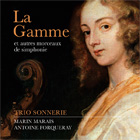 Apart
from the recording from the Alia Vox CD of the soundtrack of Tous les
Matins du Monde (Alia Vox AV/AVSA9821) – which, dare I
admit, I found a rather boring film – and a Naxos CD of his music
performed by Spectre de la Rose, I didn’t know the music of Marin
Marais at all well. I never got round to the London Baroque Harmonia Mundi
CD (HMA1951105 – budget CD or download from amazon.co.uk)
containing la Gamme and the other works from the 1723 collection,
all included on this Linn recording, so I hadn’t realised what a
remarkable piece la Gamme is. Apart
from the recording from the Alia Vox CD of the soundtrack of Tous les
Matins du Monde (Alia Vox AV/AVSA9821) – which, dare I
admit, I found a rather boring film – and a Naxos CD of his music
performed by Spectre de la Rose, I didn’t know the music of Marin
Marais at all well. I never got round to the London Baroque Harmonia Mundi
CD (HMA1951105 – budget CD or download from amazon.co.uk)
containing la Gamme and the other works from the 1723 collection,
all included on this Linn recording, so I hadn’t realised what a
remarkable piece la Gamme is.
I have to admit that I don’t reach for those two Marais recordings
which I own very often – can’t remember when I last played them
– but I don’t think that will be the case with this new Linn
recording; the quality of the music, performance and recording all practically
guarantee frequent returns. The 24/96 download sound is excellent; there’s
no need to lament the lack of an SACD equivalent, but I’ve had the
opportunity to compare the stereo SACD tracks from three recent Linn releases
with the 24/96 equivalents and have found the latter to emerge well from
the comparison, so the Studio Master downloads should be preferable to
the CD.
The Forqueray music is a little more workaday by comparison but with an
excellent booklet of notes, this is a highly desirable release; it’s
Trio Sonnerie’s debut for Linn and I hope we shall have many more
of this calibre.
Antonio VIVALDI (1678-1741) Opere teatrali vol. 11
La fida ninfa, RV714: Dramma per musica in tre atti (1732)
Sandrine Piau (soprano) – Licori
Verónica Cangemi (soprano) – Morasto
Marie-Nicole Lemieux (alto) – Elpina
Lorenzo Regazzo (bass) – Oralto
Philippe Jaroussky (counter-tenor) – Osmino
Topi Lehtipuu (tenor) – Narete
Sara Mingardo (alto) – Giunone (Juno)
Christian Senn (bass-baritone) – Eolo (Aeolus)
Ensemble Matheus/Jean-Christophe Spinosi – rec. 2008. DDD.
NAÏVE OP30410 [3CDs: 3:13:11] – from eclassical.com
(mp3 and lossless, no booklet) or classicsonline.com
(with booklet) or stream from Naxos Music Library (with booklet)
 This
is not the first recording of the work; there was an abridged version
on Vox Turnabout. No doubt the performance from La Scala on that LP was
unidiomatic and didn’t make a strong case for the music, but it’s
odd to read Stanley Sadie rubbishing the music and wishing it was 'all
worth the trouble’. Times have changed and attitudes to Vivaldi’s
operas with them but I’m sure it’s not just a matter of the
Emperor’s New Clothes that I find myself really enjoying the Vivaldi
opera recordings that I’ve heard recently, not least this offering. This
is not the first recording of the work; there was an abridged version
on Vox Turnabout. No doubt the performance from La Scala on that LP was
unidiomatic and didn’t make a strong case for the music, but it’s
odd to read Stanley Sadie rubbishing the music and wishing it was 'all
worth the trouble’. Times have changed and attitudes to Vivaldi’s
operas with them but I’m sure it’s not just a matter of the
Emperor’s New Clothes that I find myself really enjoying the Vivaldi
opera recordings that I’ve heard recently, not least this offering.
Minor reservations about (fast) tempi apart, this recording makes a very
strong case for the music; the cast are first-rate and the recording very
good.
As so often, it’s swings and roundabouts between the eclassical.com
and classicsonline.com versions; the former is offered in lossless for
the same price as mp3 – you can, indeed, have both not just either/or
– but it comes without the all-important booklet of texts which the
latter offer, albeit that their download is mp3 only. The ideal solution
for those who can is to buy the lossless version from eclassical.com and
download the booklet from Naxos Music Library.
The eclassical.com costs $34.99; the classicsonline.com at $29.97 or £23.97
is less expensive in the USA but about the same price in the UK.
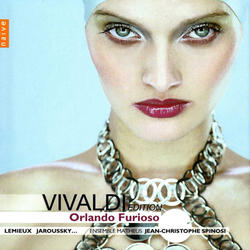 Writing
about the CPO recording of Vivaldi’s Orlando Furioso –
review
– I floated the idea of purchasing that set but adding the highlights
from the Spinosi recording on Naïve. You can obtain those highlights
– a 2-CD set with highlights from Griselda, etc. – from
classicsonline.com for £7.99 or in mp3 and lossless for $19.62 from
eclassical.com. This time, however, neither supplier offers the pdf booklet. Writing
about the CPO recording of Vivaldi’s Orlando Furioso –
review
– I floated the idea of purchasing that set but adding the highlights
from the Spinosi recording on Naïve. You can obtain those highlights
– a 2-CD set with highlights from Griselda, etc. – from
classicsonline.com for £7.99 or in mp3 and lossless for $19.62 from
eclassical.com. This time, however, neither supplier offers the pdf booklet.
Very confusingly, the Naïve complete recordings of the opera and
highlights share almost the same cover; to add to the confusion, Naïve
have also recorded the 1714 version, RV819, with Modo Antiquo and Antonio
Sardelli as well as Spinosi’s 1724/27 version, RV728/RV Anh.84, the
version which CPO also use.
The good news about the hmvdigital.com download of the Naïve/Opus111
3-CD recording of Vivaldi’s Orlando Finto Pazzo – here
– is that the price has increased to only £7.99 since I recommended
it in my April 2012/2 Download Roundup
and the new arrangement with 7digital has brought into play a much better
download manager than the one which I grumbled about.
Georg Philipp TELEMANN (1681-1767)
Tafelmusik: Musique de Table (from Parts I and II)
Overture (Suite), TWV 55:e1 in e minor for 2 flutes, strings [25:37]
Quartet, TWV 43:G2 in G for flute, oboe, violin and continuo [13:40]
Trio, TWV 42:Es1 in E-flat for 2 violins and continuo [14:24]
Conclusion in e minor, TWV 50:5 for winds, strings and continuo [4:33]
Quartet, TWV 43:d1 in d minor for 2 flutes, recorder and continuo [15:11]
Florilegium – rec. 2002, DSD.
Pdf booklet included.
CHANNEL CLASSICS CCSSA19102 [74:31] – from channelclassics.com
(SACD, mp3, 24-bit lossless and DSD)
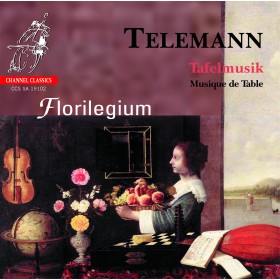 If
you just want a selection of the music from Telemann’s wonderful
Tafelmusik collection, the most enticing background music that
you could imagine, Florilegium’s album will do very nicely indeed
– sympathetic performances, excellently recorded (I listened to the
24/96 version) and complete with a fine booklet of notes. It very neatly
supplements two budget-price Hyperion Helios releases: the King’s
Consort’s recording of the Overture-Suites in D and B-flat (CDH55278
[67:02] – see March 2012/1 Roundup)
and an album of recorder concertos from Peter Holtslag and the Parley
of Instruments (CDH55091 [66:13] – see May 2010 Roundup). If
you just want a selection of the music from Telemann’s wonderful
Tafelmusik collection, the most enticing background music that
you could imagine, Florilegium’s album will do very nicely indeed
– sympathetic performances, excellently recorded (I listened to the
24/96 version) and complete with a fine booklet of notes. It very neatly
supplements two budget-price Hyperion Helios releases: the King’s
Consort’s recording of the Overture-Suites in D and B-flat (CDH55278
[67:02] – see March 2012/1 Roundup)
and an album of recorder concertos from Peter Holtslag and the Parley
of Instruments (CDH55091 [66:13] – see May 2010 Roundup).
If you are looking for the complete Tafelmusik at an attractive
price, I intended to remind you of the Harmonia Mundi 4-CD recording with
the Freiburg Baroque Orchestra and Petra Mullejans, my Bargain of
the Month in the March 2012/1 Download Roundup.
Unfortunately, however, clicking the link to hmvdigital.com now draws
a blank – perhaps they realised that they were offering a 4-disc
set for the price of one – and the classicsonline.com download at
£31.96 is almost twice the price you might expect to pay for the
CDs; our friends at MDT are offering the set for £15.00 as I write
(HMC902042/45).
Georg Philipp TELEMANN (1681-1767)
Concerto in A from Tafelmusik Part I* [24:42]
Johann Sebastian BACH (1685-1750)
Cantata No.209: Non sa che sia dolore, BWV209 [21:39]
Triple Concerto in a minor, BWV1044*** [21:26]
Lucy Crowe (soprano)**
James Johnstone (harpsichord)***
Ashley Solomon (flute)*/***
Rodolfo Richter (violin)*/***
Florilegium – rec. 2007. DSD
Pdf booklet included
CHANNEL CLASSICS CCSSA27208 [68:24] – from channelclassics.com
(SACD, mp3, 24-bit lossless and DSD)
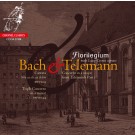
Another very brief and wholly approving review: this is a must for all
lovers of Bach’s and Telemann’s music. The combination of Florilegium
and Telemann has been described as a marriage made in heaven and their
Bach is just as fine, with Lucy Crowe in fine voice in BWV209. With excellent
recording in 24/96 format and an informative booklet of notes – I’d
forgotten Telemann’s pre-Bach association with Leipzig – only
those who object to the opportunity to compare two of the three great
North German near-contemporaries or who dislike vocal and instrumental
music in one programme need abstain.
Georg Philipp TELEMANN Paris Quartets (1738) Volume 1
Concerto No. 2 in D, TWV43:D1 [10:23]
Quartet No. 2 in a minor, TWV43:a2 [18:00]
Sonata No. 2 in A, TWV43:A1 [10:57]
Suite No. 1 in e minor, TWV43:e1 [18:48]
Ulrike Becker (cello), Linde Brunmayr-Tutz (transverse flute), Lorenz
Duftschmid (viola da gamba), John Holloway (violin), Lars Ulrik Mortensen
(harpsichord). No booklet
CPO777375-2 [58:08] – from classicsonline.com
(mp3) or stream from Naxos Music Library
Volumes 2 and 3
Concerto Primo in G, TWV43:G1 [10:14]
2ème Suite in b minor, TWV43:h1 [9:19]
1ère Suite in e minor, TWV43:e1 [17:00]
3e Quatuor in G, TWV43:G4 [20:46]
4e Quatuor in b minor, TWV43:h2 [17:36]
1er Quatuor in D, TWV43:D3 [16:10]
Sonata Seconda in g minor, TWV43:g1 [10:41]
5e Quatuor in A, TWV43:A3 [16:15]
Ulrike Becker (cello), Linde Brunmayr-Tutz (transverse flute), Lorenz
Duftschmid (viola da gamba), John Holloway (violin), Lars Ulrik Mortensen
(harpsichord) – rec. 2008. DDD
Pdf booklet included
CPO 777376-2 [57:31 + 60:56] – from classicsonline.com
(mp3) or stream from Naxos Music Library
Volume 1
Sonata Seconda in g minor [23:05]
Fantasie No.5 in A for harpsichord [5:10]
Sonata prima in A [9:39]
Fantasie No.7 in D for flute [4:10]
Concerto Secondo in D [10:36]
Fantasie No.8 for harpsichord [3:57]
Premiere Suite in e minor [15:19]
Florilegium – rec. 1998. DDD. No booklet.
CHANNEL CLASSICS CCS13598 [65:12] – from channelclassics.com
(mp3 and lossless)
Volume 2
Quatuor No.1 in D, TWV43:D3 [18:40]
Quatuor No.2 in a minor, TWV43:a2 [18:18]
Quatuor No.3 in G, TWV43:G4 [22:01]
Concerto Primo in G, TWV43:G1 [11:05]
Florilegium:
Ashley Solomon (director, baroque flute by R.Cameron 1999 after J.Denner,
1720)
Kati Debretzeni (violin, Anonymous, Italian poss. Gagliano family, c.1780)
Reiko Ichise (7 string bass viol by D.Rubio 1986 after G.Barbey, Paris
1720)
Jennifer Morsches (cello, Anonymous, Italian Tyrol, c. 1800)
James Johnstone (French double manual harpsichord by A.Garlick 1986 after
Goujon (1749)) – rec. 2003. DSD.
Pdf booklet included
CHANNEL CLASSICS CCSSA20604 [71:21] – from channelclassics.com
(mp3, 24/44.1, 24/96 and 24/192 lossless and DSD.
Volume 3
Quatuor No.4 in b minor TWV43:h2 [21:35]
Quatuor No.5 in A, TWV43:A3 [18:22]
Quatuor No.6 in e minor, TWV43:e4 [20:59]
Deuxieme Suite in b minor, TWV43:h1 (1730) [10:42]
Performers and instruments as above – rec. 2004. DSD
Pdf booklet included
CHANNEL CLASSICS CCSSA21005 [73:48] – from channelclassics.com
(mp3, 24/44.1, 24/96 and 24/192 lossless and DSD.
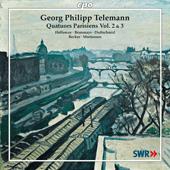 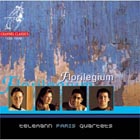 Both
the CPO and Channel Classics sets of the Paris (flute) Quartets run to
three volumes, with CDs 2 and 3 together as a set on CPO. In musical terms
there is little to choose – both are first rate – but the CPO
downloads are in (good) mp3 only, while Volumes 2 and 3 on Channel Classics
are available on SACD or as 24-bit downloads from their website; Volume
1 (CCS13598) is out of stock on CD, but can be downloaded in mp3
and 16-bit lossless. An additional materialistic consideration: you get
more for your bucks with Channel on three very well filled programmes.
You won’t go far wrong with either. Both
the CPO and Channel Classics sets of the Paris (flute) Quartets run to
three volumes, with CDs 2 and 3 together as a set on CPO. In musical terms
there is little to choose – both are first rate – but the CPO
downloads are in (good) mp3 only, while Volumes 2 and 3 on Channel Classics
are available on SACD or as 24-bit downloads from their website; Volume
1 (CCS13598) is out of stock on CD, but can be downloaded in mp3
and 16-bit lossless. An additional materialistic consideration: you get
more for your bucks with Channel on three very well filled programmes.
You won’t go far wrong with either.
Georg Philipp TELEMANN (1681-1767)
Weine nicht! Kantate zum ersten Ostertag (Cantata for Easter Sunday)
TVWV 1:1541 [18:49]
Sie verachten das Gesetz des Herrn Zebaoth, Kantate zum 10. Sonntag
nach Trinitatis (Cantata for 10th Sunday after Trinity), TVWV 1:1339
[15:16]
Gott Zebaoth in deinem Namen, Kantate zum 16. Sonntag nach Trinitatis
(Cantata for 16th Sunday after Trinity), TVWV 1:698 [17:33]
Veronika Winter (soprano); Lena Susanne Norin (alto); Jan Kobow (tenor);
Ekkehard Abele (bass)
Rheinische Kantorei; Das Kleine Konzert/Hermann Max – rec. live,
2006. DDD.
CPO 777261-2 [51:51] – from eclassical.com
(mp3 and lossless, no booklet) or stream from Naxos Music Library (with
short pdf booklet – no texts)
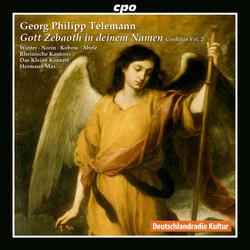 Telemann’s
cantatas are often quite different in form from what we expect from J
S Bach’s but the three here, especially the opening cantata for Easter
Sunday, are closer in form than most to the Bach model. The performances
are good, the music well worth hearing – though the lack of texts
is a hindrance to enjoyment, the clarity of diction throughout means that
German speakers should have little trouble – and the recording, made
with a mercifully quiet audience, does music and performances justice,
especially in lossless flac. Everything is under the sure direction of
Hermann Max who has given us some fine Telemann recordings on various
labels. Jonathan Woolf asks why the CPO recording below was kept on the
back burner so long; the same question applies here, too. Telemann’s
cantatas are often quite different in form from what we expect from J
S Bach’s but the three here, especially the opening cantata for Easter
Sunday, are closer in form than most to the Bach model. The performances
are good, the music well worth hearing – though the lack of texts
is a hindrance to enjoyment, the clarity of diction throughout means that
German speakers should have little trouble – and the recording, made
with a mercifully quiet audience, does music and performances justice,
especially in lossless flac. Everything is under the sure direction of
Hermann Max who has given us some fine Telemann recordings on various
labels. Jonathan Woolf asks why the CPO recording below was kept on the
back burner so long; the same question applies here, too.
CPO and eclassical.com should really resolve the issue of texts and even
Naxos Music Library need to ensure that the cut-down booklets which they
provide contain the words; they usually don’t.
Cantatas from the Grossfahner Collection
Johann Heinrich BUTTSTETT (1666-1727) Das ist meine Freude
[9:08]
Georg Friedrich KÜNSTEL (ca. 1699-1700) Was will mich die
Sünde schrecken [9:06]
Johann Heinrich BUTTSTETT Jetzt ist das Mahl bereit [8:36]
Johann PACHELBEL (1653-1706) Mein Fleisch ist die rechte Speise
[8:24]
Georg Philipp TELEMANN (1681-1767) Schmecket und sehet,
TVWV 7:32] [8:50]
Ich hoffe darauf, dass du so gnädig bist, TVWV 1:deest [11:43]
Was Jesus tut, ist wohl getan, TVWV 1:1526 [10:58]
Johann TOPF (ca. 1700) Gott, du bist mein Gott [10:35]
Maria Jonas (soprano)
Chursächsische Capelle Leipzig – rec. 2003. DDD
CPO 777546-2 [77:20] – from eclassical.com
(mp3 and lossless, no booklet) or stream from Naxos Music Library (with
detailed pdf booklet – no texts)
[‘The performances throughout are polished and effective… The
music combines relatively little known composers with such as Telemann
and Pachelbel, which is a representative reflection of the music performed
at the time … [but] why has this disc been on the back burner since
2003?’ See review
by Jonathan Woolf.]
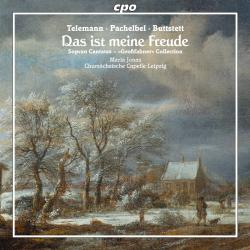 I
enjoyed hearing this as much as Jonathan Woolf appears to have done, but
I did so without the benefit of the full booklet which comes with the
CD to which he had access and which he praised. That’s a problem
not only in terms of the missing – and important – texts, even
though the diction makes the words clear enough for German speakers, but
I wouldn’t have had any information about the less well-known composers
if I’d had to rely on eclassical.com alone. Though Naxos Music Library
provides a comparatively detailed booklet of notes, it’s still devoid
of texts. This serious issue doesn’t apply just to eclassical.com’s
CPO recordings. If Chandos and Hyperion can provide full, often luxurious
booklets, why cannot the others? Eclassical.com do provide excellent full
booklets for BIS recordings from their own stable. I
enjoyed hearing this as much as Jonathan Woolf appears to have done, but
I did so without the benefit of the full booklet which comes with the
CD to which he had access and which he praised. That’s a problem
not only in terms of the missing – and important – texts, even
though the diction makes the words clear enough for German speakers, but
I wouldn’t have had any information about the less well-known composers
if I’d had to rely on eclassical.com alone. Though Naxos Music Library
provides a comparatively detailed booklet of notes, it’s still devoid
of texts. This serious issue doesn’t apply just to eclassical.com’s
CPO recordings. If Chandos and Hyperion can provide full, often luxurious
booklets, why cannot the others? Eclassical.com do provide excellent full
booklets for BIS recordings from their own stable.
Johann Buttstett wasn’t even a name to me before, though I’m
glad to make the acquaintance of his music. The three works by Telemann
provide the musical highlights but the hors d’œuvres
are all delightful. It’s all very well performed and recorded and
delightful despite my grumbles.
George Frideric HANDEL (1685-1759) Handel’s Delight
Sonata in a minor for recorder and continuo, HWV362, Op.1/4 (arr. B. Pucihar)
[11:11]
Flute Sonata in D, HWV 378 (arr. A. Panayi, Soli: M. Fuchs) [8:52]
Neun deutsche Arien, HWV202-210: Süße Stille, sanfte
Quelle (arr. L. Wesselburg) [5:51]
Die ihr aus dunklen Grüften, HWV 208 arr. R. Goldberg) [4:01]
Künft’ger Zeiten eitler Kummer, HWV 202 (arr. C. Haller)
[6:15]
Flute Sonata in b minor, Op 1/9b, HWV367b [13:46]
Sonata in e minor for flute and continuo, HWV359b, Op. 1/1b (arr. R. Ludewig)
[9:38]
Jörg Waschinski (male soprano)
Baroque and Blue (Christiane Meininger (flute), Rainer Gepp (piano), Roger
Goldberg (bass), Enno Lang (drums, percussion)) – rec. February 2012.
DDD.
NEW CLASSICAL ADVENTURE NCA60259 [60:39] – from eclassical.com
(mp3 and lossless) or stream from Naxos Music Library (with booklet)
Baroque in Blue: A Crossover between Early Music and Jazz
Music by Samuel SCHEIDT (1587-1654)
Girolamo FANTINI (1600-1675)
Jacques PHILIDOR (1657-1708)
Michel-R. DELALANDE (1657-1726)
Johann Sebastian BACH (1685-1750)
Ferdinand DONNINGER (1716-1781)
Benjamin BRITTEN (1913-1976)
F. IMMER (b.1948)
Klaus H. OSTERLOH (b.1952)
M. NAGEL (b.1958)
Friedemann Immer trumpet consort (Friedemann Immer, Klaus H. Osterloh,
Jaroslav Roucek, Thibaud Robinne (Baroque Trumpets); Frithjof Koch (Baroque
Timpani); Matthias Nagel (Organ) – rec. live, 2008. DDD.
KuK VERLAGSANSTALT KuK24 [67:56] – from eclassical.com
(mp3 and lossless) or stream from Naxos Music Library (with booklet)
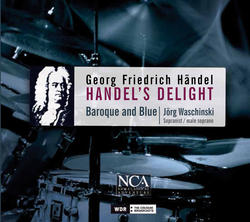 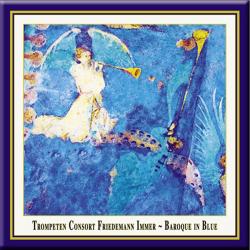 NCA:
we’re used to Bach getting this sort of treatment but Handel lends
himself almost equally well to it. My one real complaint is that the contribution
in three of the Nine German Arias of Jörg Waschincki, though
he’s billed in the blurb as’renowned’, leaves a great deal
to be desired. Otherwise this offers what it says on the label and in
the booklet (‘For Handel, ‘authentic’ would have been whatever
pleased him’); as long as you don’t take it too seriously, it’s
fun. Authenticists of a nervous disposition should avoid. NCA:
we’re used to Bach getting this sort of treatment but Handel lends
himself almost equally well to it. My one real complaint is that the contribution
in three of the Nine German Arias of Jörg Waschincki, though
he’s billed in the blurb as’renowned’, leaves a great deal
to be desired. Otherwise this offers what it says on the label and in
the booklet (‘For Handel, ‘authentic’ would have been whatever
pleased him’); as long as you don’t take it too seriously, it’s
fun. Authenticists of a nervous disposition should avoid.
KuK: Some nine minutes of the programme are taken up with a lengthy
explanation in German of what music is being played – of no great
value for most of us and none at all for non-German speakers. Though it’s
easy to programme them out, they reduce the playing time to under an hour.
Whereas the NCA recording consists wholly of the music of Handel reinterpreted
in jazz style, the KuK mixes baroque music in its original form with modern
works and rearrangements. The latter comes at just £4.99 from classicsonline.com,
complete with booklet; the eclassical.com version is a little more expensive
and is devoid of booklet but comes in lossless form at the same price
as mp3. Filter out the spoken bits and the vocal items on NCA and both
albums are fun.
Francesco GEMINIANI (1687-1762)
Twelve Concerti Grossi after Arcangelo Corelli’s Sonatas, Op.5
Ensemble 415/Chiara Banchini – rec. c.2003. DDD.
ZIG ZAG TERRITOIRES ZZT040301 [57:08 + 59:19] – from classicsonline.com
(mp3) or stream from Naxos Music Library
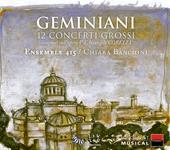 Having
recently recommended a Somm 2-CD set of Geminiani’s Op.1 sonatas
(London Handel Players, SOMMCD248 – look out for review on
main MusicWeb pages), the natural progression was to choose a version
of the his Concerto grosso arrangements of Corelli’s Op.5 sonatas,
themselves the model for Geminiani’s Op.1. The logical recommendation,
Andrew Manze with the Academy if Ancient Music on Harmonia Mundi, is now
available only in truncated form – the last six concertos at budget
price, bundled with the H-M catalogue – and even as a download it’s
elusive. Chiara Banchini and her ensemble ride to the rescue with an almost
equally recommendable alternative. Having
recently recommended a Somm 2-CD set of Geminiani’s Op.1 sonatas
(London Handel Players, SOMMCD248 – look out for review on
main MusicWeb pages), the natural progression was to choose a version
of the his Concerto grosso arrangements of Corelli’s Op.5 sonatas,
themselves the model for Geminiani’s Op.1. The logical recommendation,
Andrew Manze with the Academy if Ancient Music on Harmonia Mundi, is now
available only in truncated form – the last six concertos at budget
price, bundled with the H-M catalogue – and even as a download it’s
elusive. Chiara Banchini and her ensemble ride to the rescue with an almost
equally recommendable alternative.
Though her version, too, is elusive on disc, the classicsonline.com download
is very good value at £8.99 for almost two hours of music; the only
seller of the CDs that I’ve found online is asking £29.99,
one only available at the time of writing, though you may find these performances
as part of a 5-CD set for around £34.00, coupled with music by Albinoni,
and Porpora (recently released as ZZT316). The budget price makes
the lack of a booklet more palatable.
Wolfgang Amadeus MOZART (1756-1791)
Piano Concerto No.18 in B-flat, K456 [30:52]
Piano Concerto No.19 in F, K459 [27:35]
Cristofori/Arthur Schoonderwoerd (fortepiano) – rec. May 2012. DDD
ACCENT ACC24278 [58:29] – from classicsonline.com
(mp3, with booklet) or eclassical.com (mp3 and lossless, no booklet) or
stream from Naxos Music Library (with booklet)
Piano Concerto No.20 in d minor, K466 [30:15]
Piano Concerto No.21 in C, K467 [27:19]
Cristofori/Arthur Schoonderwoerd (fortepiano) – rec. June 2011. DDD.
ACCENT ACC24265 [57:45] – from eclassical.com
(mp3 and lossless, no booklet) or classicsonline.com (mp3) or stream
from Naxos Music Library (with booklet)
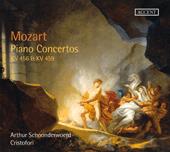 I
greatly enjoyed the small-scale Beethoven concerto recordings which Arthur
Schoonderwoerd and Cristofori made for Alpha, though I wouldn’t want
to make them my sole versions of those works – Alpha 155 (1
& 2), 122 (3 and Piano arrangement of Violin Concerto) and
079 (4&5) – and I was expecting to obtain the same pleasure
from their Mozart. There is, indeed, much to enjoy, especially if you
like smaller-scale Mozart with the solo part played on the fortepiano.
I do, especially in the ‘Elvira Madigan’ slow movement of No.21,
but overall I find the effect too much like the old-fashioned Dresden-china
Mozart for a firm recommendation, a charge from which I sought to exonerate
Hans Richter-Haaser in Concerto No.17, reissued on Beulah Extra, in my
last Download News. The orchestral openings of all the first movements
seem to promise sturdier interpretations than is the case once the soloist
enters. I
greatly enjoyed the small-scale Beethoven concerto recordings which Arthur
Schoonderwoerd and Cristofori made for Alpha, though I wouldn’t want
to make them my sole versions of those works – Alpha 155 (1
& 2), 122 (3 and Piano arrangement of Violin Concerto) and
079 (4&5) – and I was expecting to obtain the same pleasure
from their Mozart. There is, indeed, much to enjoy, especially if you
like smaller-scale Mozart with the solo part played on the fortepiano.
I do, especially in the ‘Elvira Madigan’ slow movement of No.21,
but overall I find the effect too much like the old-fashioned Dresden-china
Mozart for a firm recommendation, a charge from which I sought to exonerate
Hans Richter-Haaser in Concerto No.17, reissued on Beulah Extra, in my
last Download News. The orchestral openings of all the first movements
seem to promise sturdier interpretations than is the case once the soloist
enters.
The recordings are good, especially the eclassical.com lossless, but that
comes without the booklet. I leave the choice to you, having obtained
one volume from each of these and more than happy with either in terms
of recorded sound.
Until Ronald Brautigam reaches these works in the series which he is recording
for BIS on the fortepiano, I can only recommend staying with the best
versions on the modern piano. In Nos. 19, 20 and 21 you can’t beat
for value Alfred Brendel’s budget-price twofer on Decca, coupled
with 23, 24 and two Concert Rondos (442 2692 – 2012/24 Download
News) and there’s similar value to be had from Mitsuko Uchida’s
recording of No.18, again on a Decca twofer, with 9, 14, 15, 17 and a
Concert Rondo (473 3132). Uchida’s new recording of Nos. 9
and 21 is also well worth considering – Decca 478 3539: 2012/24
Download News – as are the classic Geza Anda recording of Nos. 6,
17 and 21 (DG Originals, budget price, or Linn UNI104 in 24-bit
sound – July 2012/2 Roundup), Howard Shelley in 12 and 19 (Chandos
CHAN9256), Clifford Curzon in 20, 23, 24, 26 and 27 (Decca 468
2912, budget price) and Imogen Cooper in 18 and 22 (Avie AV2200).
Breaking News: right on cue, BIS have released the latest volume
in the Brautigam series:
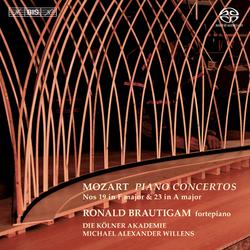 Piano
Concerto No.19 in F, K459 [25:13] Piano
Concerto No.19 in F, K459 [25:13]
Piano Concerto No.23 in A, K488 [24:44]
Kölner Akademie/Ronald Brautigam (fortepiano) – rec. December
2011. DSD
Pdf booklet included.
BIS-SACD-1964 [49:57] – from eclassical.com
(mp3, 16– and 24-bit lossless)
No.19 is here combined with my favourite among the mature Mozart concertos,
No.23. This latest release is short on playing time, but the eclassical.com
price-per-second policy takes care of that – $7.49 for mp3 and 16-bit
and the same price temporarily for 24-bit while the offer lasts. The same
virtues apply as with the earlier releases in the series which have received
some stick in certain quarters, but not from me or my MusicWeb International
colleagues. The recording is very good, especially as the 24-bit download
comes at 96kHz.
Ludwig van BEETHOVEN (1770-1827)
Piano Concerto No.1 in C, Op.15 [37:04]
Piano Sonata No.22 in F, Op.54 [10:56]
Sviatoslav Richter (piano)
Boston Symphony Orchestra/Charles Munch – rec. 1961. ADD/stereo
Pdf booklet available
HIGH DEFINITION TAPE TRANSFERS HDDL361 [48:00] – from highdeftapetransfers.com
(24/96 and 24/192)
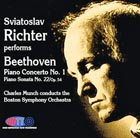 In
1970 you could have bought this recording on RCA Victrola VICS1478 for
24/– (£1.20 but at least £25 in current values). I can
guarantee that it wouldn’t have sounded as well, then or when first
released on SB21492, as it does in this very substantial HDTT reincarnation.
In 1962 it had the misfortune to appear almost simultaneously with Wilhelm
Kempff’s stereo re-recording of this concerto, with Ferdinand Leitner,
by comparison with which this recording sounded – and still sounds,
it must be admitted – rather too big-boned. Beethoven’s first
two piano concertos really demand almost as light a touch as Mozart’s,
yet in both cases that has to be without making them sound like dainty
porcelain, a feat which I’ve just accused Arthur Schoonderwoerd of
failing to achieve in Mozart. It’s a really difficult balancing act
and I think that Richter, Munch and the RCA engineers erred just too much
on the heavy side. In
1970 you could have bought this recording on RCA Victrola VICS1478 for
24/– (£1.20 but at least £25 in current values). I can
guarantee that it wouldn’t have sounded as well, then or when first
released on SB21492, as it does in this very substantial HDTT reincarnation.
In 1962 it had the misfortune to appear almost simultaneously with Wilhelm
Kempff’s stereo re-recording of this concerto, with Ferdinand Leitner,
by comparison with which this recording sounded – and still sounds,
it must be admitted – rather too big-boned. Beethoven’s first
two piano concertos really demand almost as light a touch as Mozart’s,
yet in both cases that has to be without making them sound like dainty
porcelain, a feat which I’ve just accused Arthur Schoonderwoerd of
failing to achieve in Mozart. It’s a really difficult balancing act
and I think that Richter, Munch and the RCA engineers erred just too much
on the heavy side.
That said, I know that there are many who like even early Beethoven to
sound big and they certainly won’t be disappointed. Even though it
wouldn’t be my benchmark version – that would be Stephen Kovacevich
and Colin Davis (recently reissued at budget price on Decca Virtuoso 478
4225, with No.2: download from 7digital.com)
– I enjoyed hearing it. I certainly don’t wish to give the impression
that it’s a blunderbuss of a performance – the slow movement
is very delicately done and the finale is lively and bright.
The HDTT transfer from a 4-track tape is excellent, though it can’t
disguise the fact that the RCA engineers seem to have pushed their VU
meters pretty close to the maximum – a volume reduction helps, but
not completely. I listened to the 24/96 version, the lowest-fi on offer
from HDTT, but the best that my DAC can cope with at native resolution.
At $16.00 the HDTT download comes at a fraction of the price of that Victrola
reissue, let alone the original full-price version.
Nicolò PAGANINI (1782-1840)
Moto perpetuo in C, Op. 11 [4:29]
Violin Concerto No. 5 in a minor (orch. Federico MOMPELLIO) [39:15]
I palpiti, Op. 13: Introduction and Variations on the theme di
tanti palpiti from Rossini’s opera Tancredi [11:29]
Ivan Pochekin (violin)
Russian Philharmonic Orchestra/Dmitry Yablonsky – rec. 2007 and 2011.
DDD.
Pdf booklet included
NAXOS 8.570487 [56:13] – from classicsonline.com
(mp3 and lossless)
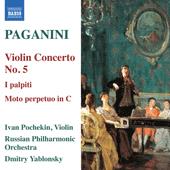 Paganini’s
violin concertos require oodles of technique and that’s something
that the young violinist here, Ivan Pochekin, possesses in abundance.
With good support from Dmitry Yablonsky and the Russian Philharmonic it’s
easy to enjoy this new recording, even to excuse the very close balance
which places the soloist in our laps in the manner of 1960s CBS recordings.
That’s not a major problem because the spotlight in this kind of
music is on the soloist; I’ve just been listening to Heifetz playing
la Campanella from Paganini’s Violin Concerto No.2 with the
Kreisler piano accompaniment and it sounds just as good in that form as
it does with orchestra because it’s the violin that counts. Paganini’s
violin concertos require oodles of technique and that’s something
that the young violinist here, Ivan Pochekin, possesses in abundance.
With good support from Dmitry Yablonsky and the Russian Philharmonic it’s
easy to enjoy this new recording, even to excuse the very close balance
which places the soloist in our laps in the manner of 1960s CBS recordings.
That’s not a major problem because the spotlight in this kind of
music is on the soloist; I’ve just been listening to Heifetz playing
la Campanella from Paganini’s Violin Concerto No.2 with the
Kreisler piano accompaniment and it sounds just as good in that form as
it does with orchestra because it’s the violin that counts.
I am less happy about having the orchestra also very forwardly recorded
– the effect is a bit overwhelming and if you over-compensate by
turning the volume down the impact is easily lost. You may actually find
the mp3 version preferable on this occasion – it seems to tone down
the in-your-lap effect somewhat – thereby saving yourself £1
or $1. I should add that a review which I’ve read – not from
MusicWeb International – reverses my thoughts and places the blame
for the less than mellifluous sound on the soloist and orchestra and gives
the recording a high rating. Yet another reviewer seems more than happy
with both performance and recording; I advise listening to some samples
first, or even streaming the whole from Naxos Music Library to see which
of us you agree with.
There are plenty of very good recordings of the earlier concertos but
No.5 tends to feature only in complete recordings of Paganini’s complete
concertos, as on the superb Salvatore Accardo; LPO/Charles Dutoit set
on DG, which remains first choice if you want the whole deal (463 7542,
6 CDs for around £30; download from 7digital.com).
If you are looking just for the works recorded here, the new Naxos will
do fine.
Hector BERLIOZ (1803 – 1869) Overtures
Le Corsaire Ouverture, Op.21 (1844) [8:03]
Overture to Béatrice et Bénédict (1862) [7:58]
Overture to Les Francs-juges, Op.3 (1826) [11:47]
Le Carnaval romain, Ouverture caractéristique, Op.9 (1844)
[8:25],
Waverley, Grande ouverture, Op.1 (1827-28) [9:53]
Le Roi Lear, Grande ouverture, Op.4 (1831) [15:20]
Overture to Benvenuto Cellini, Op.23 (1838) [10:34]
Bergen Philharmonic Orchestra/Sir Andrew Davis – rec. June 2012.
DSD.
Pdf booklet included
CHANDOS CHSA5118 [72:52] – from theclassicalshop.net
(mp3, 16– and 24-bit lossless)
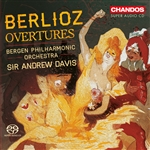 In
order to establish my benchmark I first returned to Sir Thomas Beecham
with the RPO in Carnaval romain, Roi Lear, Le Corsaire, Les Francs-juges
and Waverley overtures (1954) on Naxos Classical Archives 9.80711
[57:40], a marvellous bargain from classicsonline.com
at £1.99 if you live in a country where copyright laws allow
you to obtain it. Though I thought I remembered these performances well,
especially that of Les Francs-juges, part of which was the theme
tune for the BBC TV Arts programme Monitor, I was surprised that Beecham
adopts fairly sedate tempi, with only Lear slightly faster than
Andrew Davis, but it was one of Beecham’s tricks to be able sometimes
to take the music comparatively sedately and still leave an impression
of sparkling bravura. In
order to establish my benchmark I first returned to Sir Thomas Beecham
with the RPO in Carnaval romain, Roi Lear, Le Corsaire, Les Francs-juges
and Waverley overtures (1954) on Naxos Classical Archives 9.80711
[57:40], a marvellous bargain from classicsonline.com
at £1.99 if you live in a country where copyright laws allow
you to obtain it. Though I thought I remembered these performances well,
especially that of Les Francs-juges, part of which was the theme
tune for the BBC TV Arts programme Monitor, I was surprised that Beecham
adopts fairly sedate tempi, with only Lear slightly faster than
Andrew Davis, but it was one of Beecham’s tricks to be able sometimes
to take the music comparatively sedately and still leave an impression
of sparkling bravura.
Beecham builds up the tension very slowly at the opening of Les Francs-juges
but there’s no lack of what Trevor Harvey, commenting on the 1962
reissue, called utterly satisfying fiery attack and zest and the excitement
at the end is all the more effective for the slow build-up. Of course
the sound is dated, but not so badly as to rule this out of court for
repeated listening and far and away better than I recall that release
on GBL5833 sounding. Of course, Beecham does a few naughty things, such
as extending the penultimate chord of Le Carnaval romain but, as
TH wrote, this time in his review of the original full-price Philips release,
it’s not hard to imagine Berlioz wishing that he had thought of it.
At this point I allowed myself to be side-tracked by listening to another
Beecham classic performance of Berlioz, Harold in Italy with William
Primrose (viola), still sounding well enough, apart from some background
rumble, on Past Classics ([40:52] £1.68 from
emusic.com) to remind us what a very fine performance this is, though
recorded even earlier than the overtures. Supplement this with the LSO
Live Tabea Zimmermann/Colin Davis performance (LSO0040 – June
2010 Roundup:
no current download is likely to undercut the cost of the CD, target price
£5.40) and you have the best of both worlds.
That brief excursion allowed me to return to Andrew Davis’s version
of Les Francs-juges without making too overt a comparison with
Beecham. Davis allows the tension to build a little earlier than Beecham
but overall there’s far less difference between the two performances
than the timings might suggest (Beecham 14:30; Davis 11:53 – with
Colin Davis and the Dresden Staatskapelle on RCA splitting the difference
at 12:28). The new recording, especially in its 24/96 form, is, of course,
far superior to Beecham’s, but I still find Beecham by a very slight
margin the subtler interpreter of the music. There’s very little
in it, however, and I suspect that younger listeners, in whose psyche
the older recording is not deeply implanted, would prefer the new Chandos
recording.
If you’re looking for a modern recording of these overtures, especially
if you hanker after 24-bit better-than-CD sound, the new Chandos recording
should meet your needs. If you’re prepared to tolerate the (decent)
mono sound, Beecham is an essential extra. Alternatively, the Colin Davis
Staatskapelle recording from 1998 can be downloaded for just £4.83
from amazon.co.uk.
[NB: You’ll find in the next Download News a much more positive
review of this recording from Dan Morgan, promoted to Recording
of the Month.]
Felix MENDELSSOHN (1809-1847)
Violin Concerto in e minor, Op. 64, MWV O14* [27:05]
Violin Concerto in d minor, MWV O3* [20:38]
Violin Sonata in f minor, Op. 4, MWV Q12† [18:58]
Tianwa Yang (violin); Romain Descharmes (piano)†
Sinfonia Finlandia Jyväskylä/Patrick Gallois* – rec. August
and September 2010, December 2011. DDD.
Pdf booklet included
NAXOS 8.572662 [66:41] – from classicsonline.com
(mp3 and lossless) or stream from Naxos Music Library
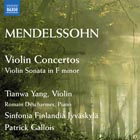 The
familiar e minor and unfamiliar early d minor Violin Concertos are here
combined, as they were by Alina Ibragimova on a recent Hyperion recording
(CDA67795
– 2012/20 Roundup
and 2012/21 Roundup).
That’s a fine version which can hold its own against most of the
very fierce competition in the e minor and which makes a very strong case
for its predecessor. The
familiar e minor and unfamiliar early d minor Violin Concertos are here
combined, as they were by Alina Ibragimova on a recent Hyperion recording
(CDA67795
– 2012/20 Roundup
and 2012/21 Roundup).
That’s a fine version which can hold its own against most of the
very fierce competition in the e minor and which makes a very strong case
for its predecessor.
I couldn’t recommend the Naxos recording as top dog for the e minor;
despite the beautiful tone of the soloist there’s not quite enough
strength in the music as presented here, for my liking, even in the lively
finale, to make it more than a good also-ran.
It is, however, well worth considering if you’re looking for a budget-price
alternative to the Hyperion, with the mp3 costing £4.99 ($7.99)
and the lossless £5.99 ($8.99) as against £6.99 for the Hyperion
in mp3 or 16-bit and £10.50 for the 24-bit version. Whichever you
choose, the coupling with the early d minor concerto on Hyperion or Naxos
leaves you free to choose a recording of the Bruch Violin Concerto that
isn’t coupled with Mendelssohn, of which my favourite would be Kyung-wha
Chung on Decca, with Bruch’s Scottish Fantasia, a work which
I love even more than his Violin Concerto.
Joachim RAFF (1822 – 1882) Orchestral Works Volume 1
Symphony No. 2 in C, Op.140 (1866) [33:41]
Orchestral Prelude to Shakespeare’s ‘The Tempest’, in g
minor, WoO 49 (1879) [14:10]
Orchestral Prelude to Shakespeare’s ‘Macbeth’, in c minor,
WoO 50 (1879) [11:22]
Orchestral Prelude to Shakespeare’s ‘Romeo and Juliet’,
in D, WoO 51 (1879) [9:46]
Orchestral Prelude to Shakespeare’s ‘Othello’, in D, WoO
52 (1879) [8:14]
Orchestre de la Suisse Romande/Neeme Järvi – rec. June 2012.
DSD
Pdf booklet included
CHANDOS CHSA5117 [77:47] – from theclassicalshop.net
(mp3, 16– and 24-bit lossless)
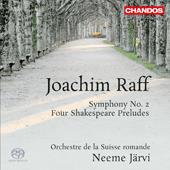 I’ve
only ever heard Raff’s music before in conjunction with his older
contemporary Mendelssohn – both their Octets on Chandos CHAN8790
– and it’s Mendelssohn who is brought to mind by the Second
Symphony which opens this recording. The interest in Shakespeare which
begat the four preludes was part of the deal with German Romanticism;
here, too, the model is Mendelssohn, with whose music Raff was fascinated
to the point of obsession, but with more than a hint, too, of Schumann. I’ve
only ever heard Raff’s music before in conjunction with his older
contemporary Mendelssohn – both their Octets on Chandos CHAN8790
– and it’s Mendelssohn who is brought to mind by the Second
Symphony which opens this recording. The interest in Shakespeare which
begat the four preludes was part of the deal with German Romanticism;
here, too, the model is Mendelssohn, with whose music Raff was fascinated
to the point of obsession, but with more than a hint, too, of Schumann.
Full marks to Chandos for digging his music out of near-obscurity –
I note that this is billed as‘Volume 1’ so there’s more
to come. Tudor have also been recording his music – Symphony No.
2 is on TUDOR7102 with the Suite aus Thüringen –
and the only other rival version of the Second Symphony is download-only
from Marco Polo (8.223630, with Macbeth and Romeo
Preludes). Rob Barnett thought that the allegro opening movement of the
Tudor recording might have been more spry, though at 11:33 Hans Stadlmair
is a minute faster than Neeme Järvi on the new recording. Urs Schneider’s
tempo on Marco Polo is also faster than Järvi’s but I never
thought that Järvi’s performance dragged. If the fairies in
the scherzo are a trifle leaden-footed by comparison with Mendelssohn’s,
that’s more Raff’s fault than Järvi’s. You can compare
the three recordings for yourself from the Naxos Music Library and they
can be downloaded from classicsonline.com (mp3) and eclassical.com (mp3
and lossless).
For a follow-up, why not try Gerald Fenech’s 4-star recommendation
of Raff’s Symphonies Nos. 3 and 4 on budget-price Hyperion Helios
CDH55017? Download from hyperion-records.co.uk
(mp3 and lossless); review here.
[Dan Morgan’s review of this recording arrived just too late for
inclusion; please see forthcoming Download News 2013/5.]
Johannes BRAHMS (1833-1897) Symphony No.4 in e minor, Op.98* [37:36]
Felix MENDELSSOHN (1809-1847) Symphony No.4 in A, Op.90 (‘Italian’)**
[25:52]
BBC Symphony Orchestra; Royal Philharmonic Orchestra/Sir Adrian Boult
– rec. BBC, 1975*, 1972**. ADD
ICA CLASSICS ICAC5093 [63:28] – from eclassical.com
(mp3 and lossless)
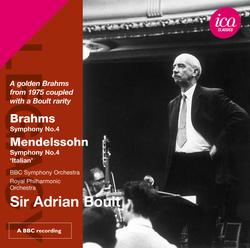 Between
Sir Adrian Boult and Johannes Brahms there is a clearly traceable and
comparatively short musical family tree. In itself that wouldn’t
be significant but, in fact, Boult’s Brahms is very special, as ICA’s
two earlier recordings of the First and Third Symphonies have demonstrated
(ICAC5091 – review
and June 2011/1 Roundup
– and ICAC5063 – March 2012/2 Roundup
– both with very good Elgar couplings). This recording of the Fourth
from 1975 continues ICA’s good work in reminding us just how special
that rapport was; his Fourth now joins a select few recordings of that
work at the top of the tree for me, with Klemperer (EMI – shortly
due for reissue at a very special price) still just at the apex. Between
Sir Adrian Boult and Johannes Brahms there is a clearly traceable and
comparatively short musical family tree. In itself that wouldn’t
be significant but, in fact, Boult’s Brahms is very special, as ICA’s
two earlier recordings of the First and Third Symphonies have demonstrated
(ICAC5091 – review
and June 2011/1 Roundup
– and ICAC5063 – March 2012/2 Roundup
– both with very good Elgar couplings). This recording of the Fourth
from 1975 continues ICA’s good work in reminding us just how special
that rapport was; his Fourth now joins a select few recordings of that
work at the top of the tree for me, with Klemperer (EMI – shortly
due for reissue at a very special price) still just at the apex.
Though I greatly enjoyed Boult, I simply had to revisit Klemperer’s
Fourth straight afterwards and I have to say that I still give it pride
of place. In the first two movements Boult is a little faster, as you
might expect, but Klemperer’s Fourth is far from monumental –
in the third movement there are only ten seconds in it and in the finale
he’s actually a tad faster than Boult, even allowing for the brief
applause on ICA. Though dating from the late 1950s the recording is surprisingly
good, too – brighter than the ICA – so it’s well worth
looking out for Klemperer’s Brahms symphonies when they are re-reissued.
Judging by the prices being asked for his Beethoven and Bruckner, that
new release shouldn’t break the bank, either.
The recording, made in the Royal Albert Hall with a reasonably quiet audience,
sounds typical of BBC broadcasts of the time – essentially truthful
but hardly of demonstration quality. As with the other releases it’s
just a little lacking in the top frequencies, but that’s better than
sounding too shrill.
The Mendelssohn, recorded a little earlier, in 1972, again in the Royal
Albert Hall, may not be so special a coupling as Boult’s Elgar Enigma
Variations coupling for the ICA recording of the Brahms First, but
it’s well worth hearing and the recording is good considering its
provenance.
George Whitfield CHADWICK (1841-1931)
Symphony No.2 in B-flat [35:05]
Symphony No.3 in F [35:20]
Detroit Symphony Orchestra/Neeme Järvi – rec. 1993 and 1994.
DDD.
Pdf booklet included
CHANDOS CHAN9685 [70:37] – from theclassicalshop.net
(mp3 and lossless) or stream from Naxos Music Library
Adonais: Elegiac Overture (1899) [15:21]
Cleopatra: Symphonic Poem (1904) [21:22]
A Pastoral Prelude for orchestra (1890) [12:58]
Sinfonietta in D (1904)* [19:00]
World Premiere Recordings except* (First Digital Recording)
BBC Concert Orchestra/Keith Lockhart – rec. January/February 2012.
DDD
DUTTON CDLX7293 [68:44] – from emusic.com
(mp3)
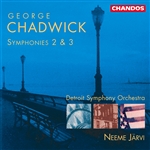 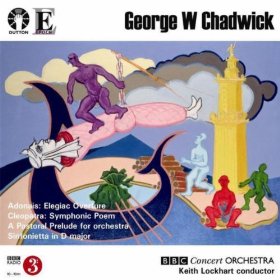 Chadwick’s
music won’t make you feel that the earth has moved – it’s
much more conventional than that of his near-neighbour and younger contemporary
Charles Ives – but it’s very pleasant to listen to and in some
moods I’d rather hear Chadwick than Ives, though the boot would usually
be on the other foot. On second thoughts, Ives’s early symphonies
are pretty conventional, too. Chadwick’s
music won’t make you feel that the earth has moved – it’s
much more conventional than that of his near-neighbour and younger contemporary
Charles Ives – but it’s very pleasant to listen to and in some
moods I’d rather hear Chadwick than Ives, though the boot would usually
be on the other foot. On second thoughts, Ives’s early symphonies
are pretty conventional, too.
For some reason the Chandos is listed in some quarters as a mid-price
2-CD set; it isn’t, it’s a single full-price disc (£7.99
for mp3, £9.99 for lossless download). The two symphonies there
are probably the best place to start; the music is very tuneful, the performances
and recording excellent, and they come with a booklet of notes containing
information about Chadwick, which you won’t get with the Dutton download.
These notes include the interesting speculation that Chadwick may have
influenced Dvořák, instead of vice versa as is usually assumed.
The least expensive way to obtain the Dutton recording is from
emusic.com for members (£2.94 or less); alternatively it’s
£6.23 from amazon.co.uk.
The emusic.com download is at around 230kb/s, so there’s likely to
be little advantage in paying more for the amazon.com – or even more
from iTunes – since they both come at a nominal best of 256kb/s.
Despite the low bit-rate, the recordings are more than serviceable and
the performances much more than that. This is a recommended follow-up
to the Chandos symphonies.
The two Reference Recordings releases of Chadwick’s tone poems which
Rob Barnett recommended – review
– remain available on CD a 2-disc set – review
– from MDT
and Amazon.co.uk.
Download (mp3 with booklet) from classicsonline.com
or stream from Naxos Music Library.
Jean SIBELIUS (1865-1957)
Symphony No. 1 in e minor, Op. 39 [34:43]
Symphony No.4 in a minor, Op. 63 [38:28]
Minnesota Orchestra/Osmo Vänskä
Pdf booklet available.
BIS-SACD-1996 [74:10] – from eclassical.com (mp3, 16–
and 24-bit lossless) [NB: due for release during March 2013: link and
image not available at time of writing]
Osmo Vänskä’s earlier recording of the Sibelius First Symphony
for BIS with the Lahti Symphony Orchestra is an absolute cracker –
one of several strong recommendations for this work. Now he has re-recorded
it, coupled again with the Fourth, encompassing the warmest and coolest
of the composer’s music, with the Minnesota Orchestra. This release,
intended for March 2013, has been brought forward in the wake of the orchestra’s
recent Grammy nomination for the recording of the popular Second and Fifth
Symphonies (BIS-SACD-1986).
As with that recent release, the new recording of the First is a shade
faster and less intense than before and though it remains a strong contender,
with a world-class orchestra, I can’t help feeling that the Scandinavian
orchestra on the earlier recording helped Osmo Vänskä to deliver
a more Sibelian sound.
The Fourth is perhaps the least well-known of Sibelius’ symphonies
– it certainly doesn’t have the warm, immediate appeal of the
First, Second and Fifth, so it’s something of a gamble to couple
Nos. 1 and 4. Once again, apart from the first movement, Vänskä’s
tempi are faster than before and I find myself admiring the new recording
but liking the older version more – if that’s the right word
for this gaunt symphony.
The older recording of these symphonies also comes as part of a very generous
5-disc box set of all the symphonies, on CD or, marginally less expensive
still, as a download from eclassical.com
(BIS-CD-1933/35 – review
and review
of the earlier 4-CD set); it’s also available as part of an unbelievable
£5.99 bargain set from amazon.co.uk of all the symphonies, including
both versions of the Fifth, the Violin Concerto, Karelia and Lemminkaïnen
suites, Finlandia and En Saga – Nick Barnard pointed
me in the direction of that some time ago – Bargain of the
Month – June 2011/2 Roundup.
Though in mp3, and at around 225kb/s rather than the full 320kb/s, it
sounds very well indeed.
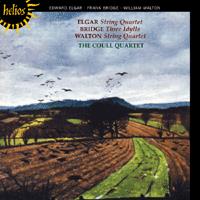
Sir Edward ELGAR (1857-1934) String Quartet in e minor, Op.83 [29:07]
Frank BRIDGE (1879-1941) Three Idylls, H67 [14:56]
Sir William WALTON (1902-1983) String Quartet in a minor [27:50]
The Coull Quartet – rec. 1993. DDD
Pdf booklet included
HYPERION HELIOS CDH55218 [71:53] – from hyperion-records.co.uk
(mp3 and lossless)
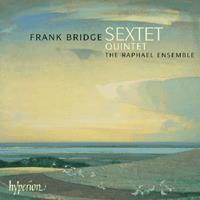 Frank
BRIDGE (1879-1941) Early Chamber Music Frank
BRIDGE (1879-1941) Early Chamber Music
String Sextet in E-flat (1906/1913) [26:57]
Lament for two violas* [8:51]
String Quintet in e minor [30:02]
* Louise Williams (viola), Asdis Valdimarsdottir (viola)
The Raphael Ensemble – rec. 2004. DDD
Pdf booklet included
HYPERION CDA67426 [65:50] – from hyperion-records.co.uk
(mp3 and lossless)
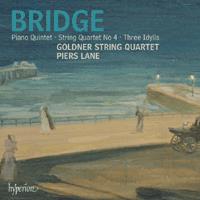 Piano
Quintet, H49a (1905) [28:16] Piano
Quintet, H49a (1905) [28:16]
Three Idylls, H67 (1907) [13:32]
String Quartet No.4, H188 (1937) [23:00]
Goldner String Quartet (Dene Olding (violin); Dimity Hall (violin); Irina
Morozova (viola); Julian Smiles (cello)); Piers Lane (piano) – rec.2008
Pdf booklet included
HYPERION CDA67726 [65:19] – from hyperion-records.co.uk
(mp3 and lossless)
[Recording of the Month – see review
by John France]
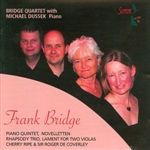 Piano
Quintet (1905-12) [30:21] Piano
Quintet (1905-12) [30:21]
Three Novelletten for string quartet (1904) [12:44]
Rhapsody Trio for 2 violins and viola (1928) [17:26]
Lament for 2 violas (1912) [8:59]
Cherry Ripe (1916) [3:19]
Sir Roger de Coverley (1922) [4:31]
Bridge Quartet (Colin Twigg and Catherine Schofield (violins); Michael
Schofield (viola); Lucy Wilding (cello)); Michael Dussek (piano) –
rec. 2008. DDD
SOMM SOMMCD087 [77:56] – from theclassicalshop.net
(mp3 and lossless)
[see reviews
by John France and Rob Barnett]
Piano Trio No. 1 – Phantasie Trio (1907) [17:02]
Phantasy Piano Quartet (1911) [13:08]
Piano Trio No. 2 (1929) [34:41]
Dartington Piano Trio – rec. 1987. DDD
HYPERION HELIOS CDH55063 [64:55] – from hyperion-records.co.uk
(mp3 and lossless)
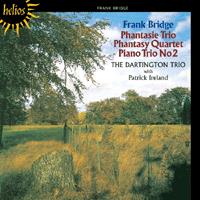 [‘Snap
up this disc’: see review
by Rob Barnett] [‘Snap
up this disc’: see review
by Rob Barnett]
The Britten centenary celebrations may, not unreasonably, lead you back
to the music of his mentor, Frank Bridge. These recordings individually
and collectively represent a treasure trove of English chamber music and,
with two of the recordings at budget price, it won’t cost you a fortune
to obtain them even if, as I suggest, you obtain all four and thereby
duplicate some of the music.
For Chandos’s 6-CD collected orchestral works of Bridge, now reissued
in the Hickox edition (CHAN10729X, also separately at full price),
please see review,
review
and June 2012/2 Download Roundup.
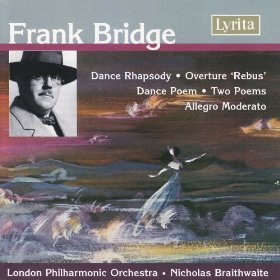 Alternatively,
for a more manageable selection of his orchestral music: Alternatively,
for a more manageable selection of his orchestral music:
Dance Rhapsody (1908) [18:22]
Dance Poem (1913) [15:38]
Two Jefferies Poems: (1) The Open Air; (2) The Story of My Heart (1916)
[7:44; 4:25]
Overture Rebus (1940) [10:38]
Allegro Moderato for string orchestra (1941) [14:47]
London Philharmonic Orchestra/Nicholas Braithwaite – rec. 1979. ADD
LYRITA SRCD.243 [71:38] – from emusic.com
(mp3) or purchase CD from MusicWeb
International.
[Recording of the Month: see review
by Rob Barnett and review
by Jonathan Woolf.]
Igor STRAVINSKY (1882-1971) Le Sacre du Printemps (Rite
of Spring) [35:33]
Olivier MESSIAEN (1908-1992) L’Ascension [20:47]
Houston Symphony Orchestra/Christoph Eschenbach (Stravinsky); Erich Bergel
(Messiaen) – rec. live 1987 (Stravinsky) and 1989 (Messiaen)
Pdf booklet available.
HIGH DEFINITION TAPE TRANSFERS HDDL343 [57:20] – from highdeftapetransfers.com
(24/96 and 24/192 lossless)
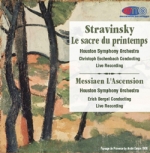 I
hadn’t realised just how much these two works had in common until
I heard them together in this apt coupling of two live recording made
live at Jones Hall, Houston, in 1987 and 1989. The comparison is especially
apt because, as the notes indicate, Erich Bergel doesn’t bask in
the full religiosity of the Messiaen; if that’s what you’re
looking for you may well be disappointed – rather he emphasises the
power of the music, though without diminishing the ethereal nature of
the final prayer of Christ as He ascends to God. I
hadn’t realised just how much these two works had in common until
I heard them together in this apt coupling of two live recording made
live at Jones Hall, Houston, in 1987 and 1989. The comparison is especially
apt because, as the notes indicate, Erich Bergel doesn’t bask in
the full religiosity of the Messiaen; if that’s what you’re
looking for you may well be disappointed – rather he emphasises the
power of the music, though without diminishing the ethereal nature of
the final prayer of Christ as He ascends to God.
Christoph Eschenbach doesn’t go hell for leather in the Rite of
Spring but eases us gently into the action. Having turned down the
volume slightly for the HDTT Richter Beethoven recording (above) I found
myself having to turn it up again to get the full power of this performance,
but when things get going there’s no lack of strength in this performance.
As far as I’m aware, Eschenbach never recorded Stravinsky commercially,
so this release is especially welcome. Only those looking for maximum
oomph throughout are likely to be disappointed.
For once HDTT were not having to make the best of 50-year-old tapes with
all the inherent problems, but had access to the 16-bit digital original
of the Stravinsky and a 16-bit backup of the original analogue tape of
the Messiaen; the result is excellent at 24/96, so 24/192 should sound
even better for those with a suitable DAC. I could have wished that the
Stravinsky had not been divided into so many tracks; there’s a slight
hiatus at a couple of transitions when played via Winamp, a very unusual
occurrence with flac. Songbird -another free programme – copes better,
as usual, though not ideally and you’ll have to reassemble the tracks
in the right order to play them there.
John WILLIAMS (b. 1932) (arr. Jay BOCOCK)
Catch Me If You Can, for alto saxophone and band (2002)* [6:52]
Darius MILHAUD (1892-1974)
La création du monde, for 2 flutes, oboe, 2 clarinets in
B flat, bassoon, alto saxophone, horn, 2 trumpets, trombone, percussion,
piano, 2 violins, cello and double bass (1923) [16:13]
Roger BOUTRY (b. 1932)
Divertimento pour saxophone alto et orchestre d’harmonie (1963/2007)*
[8:48]
Paul CRESTON (1906-85)
Concerto for alto saxophone and band, Op.26b (1941/44)* [1904]
Anders EMILSSON (b. 1963)
Salute the band, for wind ensemble and percussion (2006) [11:57]
Ástor PIAZZOLLA (1921-92)
Escualo (1979)* arranged for alto saxophone and band by TEHO
[4:03]
Claude Delangle (alto saxophone)*
Swedish Wind Ensemble/Christian Lindberg
Additional players in Milhaud: Jonas Lindgård and Christian Bergqvist
(violin), Christina Wirdegren Alin (cello,) Stefan Lindgren (piano) –
rec. 2007. DDD.
Pdf booklet included
BIS-CD-1640 [68:35] – from eclassical.com
(mp3, 16– and 24-bit lossless) or stream from Naxos Music Library
Francis POULENC (1899-1963) Les Biches: Orchestral Suite
[20:29]
Jacques IBERT (1890-1962) Divertissement for chamber orchestra
[15:26]
Darius MILHAUD (1892-1974) Le Bœuf sur le toit, Op.
58 [16:15]
La Création du Monde, Op. 81 [15:53]
Ulster Orchestra/Yan Pascal Tortelier – rec. 1991. DDD
Pdf booklet available
CHANDOS CHAN9023 [67:27] – from theclassicalshop.net
(mp3 and lossless) or stream from Naxos Music Library
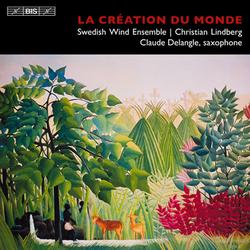 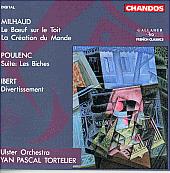 I’m
surprised that we have had to wait over five years for the BIS
recording to appear. Perhaps the fact that it was recorded in DDD and
at 24/44.1, rather than the more audiophile DSD and 24/96, was thought
to be a handicap. If that’s the case, it’s no detriment as far
as I’m concerned – there’s nothing amiss with the recording,
except that it needs to be played at a slightly higher volume than usual
for the full impact. I’m
surprised that we have had to wait over five years for the BIS
recording to appear. Perhaps the fact that it was recorded in DDD and
at 24/44.1, rather than the more audiophile DSD and 24/96, was thought
to be a handicap. If that’s the case, it’s no detriment as far
as I’m concerned – there’s nothing amiss with the recording,
except that it needs to be played at a slightly higher volume than usual
for the full impact.
The programme is adventurous, combining the familiar Milhaud with much
less well known works. There are, of course, plenty of good rival recordings
of La Création du Monde, some of them a little more energetic
than the performance here, which makes up in smoochiness what it lacks
in force. With Bernstein’s classic recording available at budget
price on an EMI twofer of Milhaud concertos (0946882: review
and Bargain of the Month review
of earlier release; also Brilliant Classics 9007 – review)
it makes sense for BIS to give the Milhaud work’s title to the whole
album but also to regard the other works an important auxiliary selling
point.
I listened again to Bernstein (from Naxos Music Library) just to make
sure that I wasn’t being too hard on Christian Lindberg and his team
and there is a greater sense of momentum, even though Bernstein takes
a few seconds longer overall (16:57 against 16:13). He manages to make
the music both dreamy and volatile at the same time, as Rob Barnett puts
it in his review
of the Brilliant Classics set. The difference is most marked in part four,
le désir (track 8 on BIS). Don’t be tempted to purchase the
Bernstein as a download; I haven’t found a single supplier (UK or
US) who isn’t asking much more than the CDs cost in their respective
countries.
It’s the couplings that make the new BIS recording appealing; they’re
all very attractive and, though I’ve no benchmark for them as I have
with the Milhaud, they are well performed and recorded. The vivid ‘Douanier’
Rousseau cover adds to the attractiveness of the whole, even if I didn’t
find the title work quite as colourful as it might have been.
In terms of sheer enjoyment the Chandos recording has a great deal
to offer: here two Milhaud ballets are coupled with equally jazzy music
by Poulenc and the wonderfully raucous Ibert Divertissement, complete
with police whistles in the riotous finale, which opens with discordant
piano chords in a parody of Schoenberg and his ilk. It’s all very
well played under the direction of a conductor with the music in his blood
and very well recorded (16-bit only, but very good) and it still justifies
its full-price status. I don’t recall even the classic Decca recording
of the Ibert sounding better (PCO/Martinon, preserved on Decca the Classic
Sound 478 2826, 50CDs. CD33, the Ibert and its original couplings,
with the SXL cover, from 7digital.com).
Nor did I think the two Milhaud ballets outshone by Bernstein.
Duke ELLINGTON (1899-1974)
Harlem (orch. Maurice PERESS) (1950) [14:27]
Black, Brown, and Beige – Suite (orch. Maurice PERESS)
(1943) [18:29]
Three Black Kings – Ballet (completed by Mercer ELLINGTON)*
(1974) [18:10]
The River – Suite (orch. Ron COLLIER) (1970) [21:04]
Billy STRAYHORN (1915-67), arr. ELLINGTON: Take the ‘A’
Train† (1939) [6:19]
Sal Andolina (clarinet* and alto saxophone*†), Tony Di Lorenzo (trumpet)†,
Amy Licata (violin)†
Buffalo Philharmonic Orchestra/JoAnn Falletta – rec. May, 2012. DDD.
NAXOS AMERICAN CLASSICS 8.559737 [78:30] – from classicsonline.com
(mp3 and lossless) or stream from Naxos Music Library
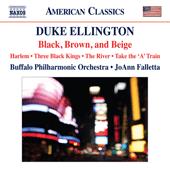 [‘A
vital and very generous collection showcasing a concert Ellington who
loved his commercial roots yet had more to give and gave it.’ See
review
by Rob Barnett.] [‘A
vital and very generous collection showcasing a concert Ellington who
loved his commercial roots yet had more to give and gave it.’ See
review
by Rob Barnett.]
No apologies for including Duke Ellington’s music not under a separate
‘jazz’ or ‘light music’ heading but alongside the
music of ‘classical’ composers. The suite from The River
in particular can hold its head high in any company; it has been, indeed,
one of my favourite pieces of music ever since I heard Julian Joseph and
his team perform it on Radio 3. That broadcast led me to the Virgin Megastore,
now sadly defunct, next time I was in Central London to buy the Chandos
recording (CHAN9909). Like everything else here it receives a sympathetic
performance, well recorded.
The date which Naxos give for Three Black Kings, 1943, is surely
an error – the work was intended as a eulogy for Martin Luther King.
Left incomplete at the time of Ellington’s death in 1974, he gave
his son instructions on how to complete it. Even if you have that Chandos
recording of The River, this is a recommended purchase – and
an inexpensive one.
Alan BUSH (1900-1995)
Dance Overture Op.12 (1930 orch. 1935)* [12:26]
Lascaux Symphony Op.98 (Symphony No.4)** (1982-83) [41:54]
Dorian Passacaglia and Fugue Op.52 (1959) [19:46]
**Sam Hutchings (piano)
Royal Scottish National Orchestra/Martin Yates – rec. 15-16 May 2012.
DDD
World Premiere Recordings, except * World Premiere Recording in orchestral
version
DUTTON EPOCH CDLX7294 [74:05] – from amazon.co.uk
(mp3)
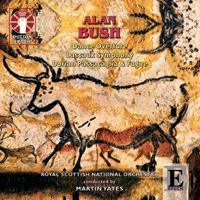 Dutton
here do more sterling service in introducing us to unknown music which
ought to be better known; it deserves to sell for the sake of the eye-catching
cover alone. The prehistoric art there confirms that the principal work
on the album is indeed inspired by the Lascaux Caves and their artworks,
an obvious deduction though there are no notes with the download, a serious
problem when the music is so unfamiliar. In the past Dutton’s homepage
has been a source of basic information, but even that is unavailable,
something which the record companies and download sites need seriously
to deal with. Dutton
here do more sterling service in introducing us to unknown music which
ought to be better known; it deserves to sell for the sake of the eye-catching
cover alone. The prehistoric art there confirms that the principal work
on the album is indeed inspired by the Lascaux Caves and their artworks,
an obvious deduction though there are no notes with the download, a serious
problem when the music is so unfamiliar. In the past Dutton’s homepage
has been a source of basic information, but even that is unavailable,
something which the record companies and download sites need seriously
to deal with.
All I can tell you is that the piano represents the human spirit struggling
against the odds and that the four movements are:
i. The Wild (Molto moderato e quieto – Molto energico – Tempo
primo)
ii. The Children (Allegro vivace)
iii. Ice Age Remembered (Molto largo)
iv. Mankind Emergent (Allegretto scorrevole – Theme –
Variations 1-6 – Finale: Allegro moderato ed energico)
You’ll find more about the composer at alanbushtrust.org.uk.
I haven’t yet come to love the music – it’s a little
too cerebral and detached for that, despite the fact that the composer
evidently fell in love with the cave art – but I like it already
and everything is well performed and recorded.
Dutton have already given us a recording of Bush’s chamber music;
now let’s hope they (or Chandos or Hyperion?) bring us the remaining
symphonies, which are no longer generally available on CD, though classicsonline.com
offer the ClassicO recordings of Nos. 1 and 2 for £4.99 (CLASSCD484,
Royal Northern College of Music/Douglas Bostock – stream from Naxos
Music Library).
Fifties Film Themes
Love Is a Many Splendored Thing (from ‘Love Is a Many Splendored
Thing’) [2:46]
Moulin Rouge (from ‘Moulin Rouge’) [2:33]
Fanny (from ‘Fanny’) [4:10]
Love’s Roundabout (from ‘La Ronde’) [2:39]
Three Coins in the Fountain (from ‘Three Coins in the Fountain’)
[3:29]
A Summer Place (from ‘A Summer Place’) [3:01]
Limelight (from ‘Limelight’) [2:58]
Tammy (from ‘Tammy and the Bachelor’) [3:04]
Gigi (from ‘Gigi’) [4:05]
HI-Lili, Hi-Lo (from ‘Lili’) [3:07]
Pepe (from ‘Pepe’) [2:12]
The High and the Mighty (from ‘The High and the Mighty’)
[3:04]
Joseph Seal at the Wurlitzer of the ABC, Kingston on Thames – rec.
1962. ADD/stereo
BEULAH 1PD61 [37:13] – from iTunes
(mp3)
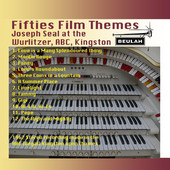
They don’t make them like this anymore and I don’t mean that
pejoratively. There should be a ready market for this release – all
those who listen to Friday Night is Music Night and
The Organist Entertains on BBC Radio 2 for starters – and
that includes me, in the right mood. The timing is rather short, but that’s
all there was on the original Decca release (SKL4154). The recording still
sounds well in this refurbishment.
When this recording was first released in 1962 it was up against an LP
from Reginald Dixon, the acknowledge master of the Wurlitzer in Blackpool
Tower Ballroom – perhaps Beulah would refresh some of Dixon’s
recordings of this vintage now.
The Famous C.W.S Manchester Band
Giuseppe VERDI La Forza del Destino Overture [7:12]
Sir Arthur SULLIVAN
The Mikado Selection [6:23]
The Yeomen of the Guard Selection [8:33]
Patience Selection [8:05]
HMS Pinafore Selection [4:00]
Iolanthe Selection [11:37]
Pyotr Ilyich TCHAIKOVSKY (arr. Denis WRIGHT) 1812 Overture [14:36]
Edvard GRIEG The Last Spring: Elegiac Melody, Op.34/2 [4:14]
Franz von SUPPÉ Light Cavalry Overture [6:04]
Carl FRIEDEMANN Slavonic Rhapsody No.2, Op.269 [6:32]
CWS (Manchester) Band/Alex Mortimer – rec. 1962 ADD/stereo.
BEULAH 1PD59 [77:20] – from iTunes (mp3)
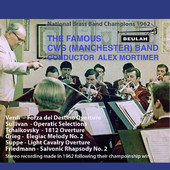 The
band had just won the National Brass Championships, for which the Verdi
overture had been the test piece, when these recordings were released
and they were at the height of their fame, with recordings coming out
every few months on Fontana and later on Decca. The
band had just won the National Brass Championships, for which the Verdi
overture had been the test piece, when these recordings were released
and they were at the height of their fame, with recordings coming out
every few months on Fontana and later on Decca.
Some of these tracks were released on an LP entitled National Champions
(STL5199) – surprisingly the items that caught the critical ear
of W A Chislett from that LP, by Gilbert Vinter and an eighteenth-century
composer Senaillé, have not been included but I can agree with
WAC that the band is in great form throughout and the recording still
sounds well in this transfer, with just a slight veiling of the sound
and a slight degree of tonal instability on sustained notes by comparison
with modern DDD offerings.
By contrast with the Wurlitzer recording, this album offers very generous
playing time, yet is offered by iTunes for a pound less, at £6.99.
You’ll find nine minutes of excerpts on YouTube – here.
Late News
As I was converting this review to html I downloaded the first of the
King’s Consort’s new recordings on their own label, Vivat,
music by Parry and Stanford – a very welcome recording in its own
right since these two composers are still underrated, but even more
so because it marks new ground for a group usually associated with the
likes of Monteverdi and Vivaldi. There are mp3, 16- and 24-bit lossless
versions at prices ranging from £8 to £15 - I listened to
the CD-quality 16-bit flac and found performance and recording very
good; there’s also a 66-page pdf booklet which outdoes even Hyperion,
Chandos, Gimell and Linn. More in DL News 2013/5. (VIVAT101 -
from vivatmusic.com).
See review
of CD by John Quinn: A Recording of the Month.
Just in case my next Download News doesn’t get online before Good
Friday, I must report very favourable initial impressions of the premiere
recording of Pergolesi’s Seven Words of Christ dying on the
Cross (Harmonia Mundi HMC902155 (33205695) , Akademie fur
alte Musik/René Jacobs, download in mp3, 16- and 24-bit lossless from
eclassical.com.
I've just received for review the Warner/Teldec Complete Works of Bach
(153 CDs) on a USB memory stick. Guess what will be the major topic
of my next DL News.
|



 All Nimbus reviews
All Nimbus reviews








